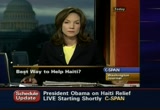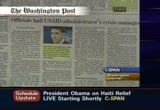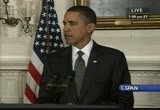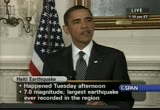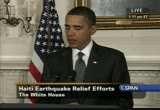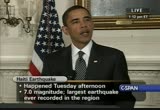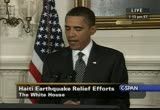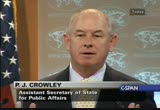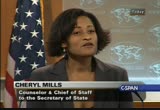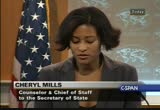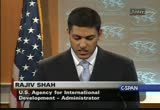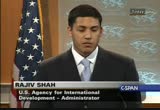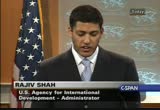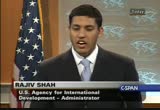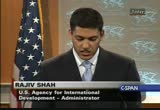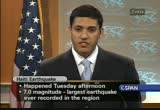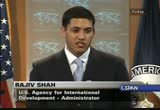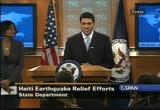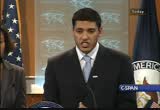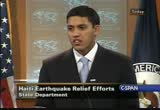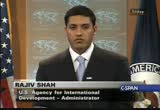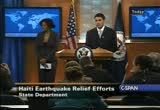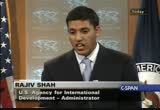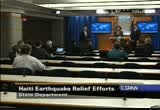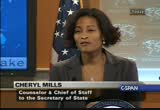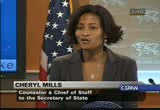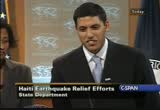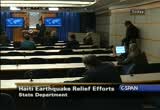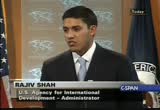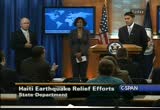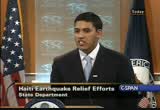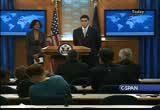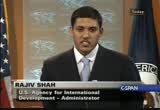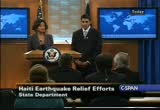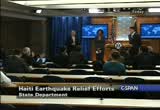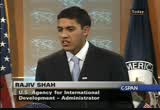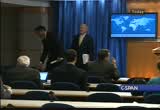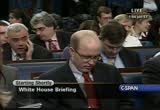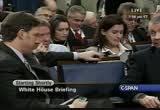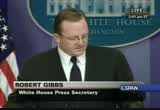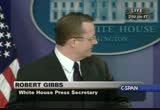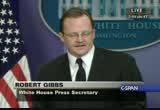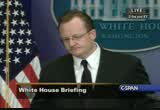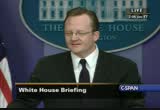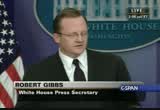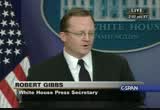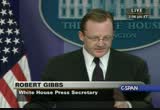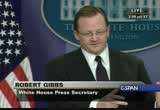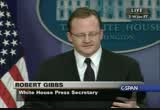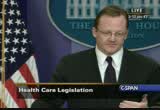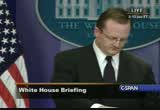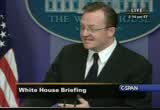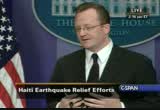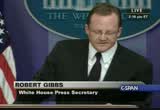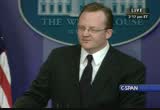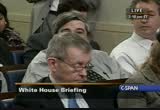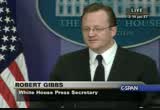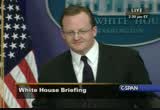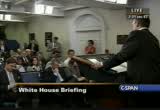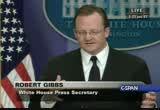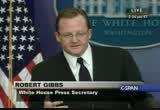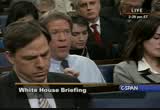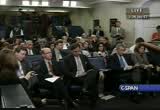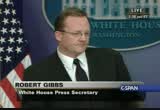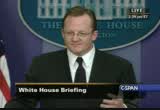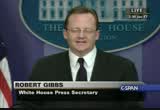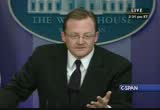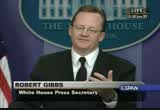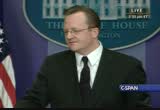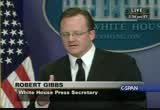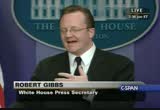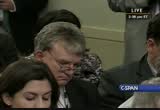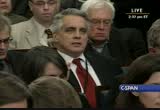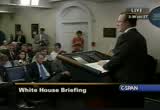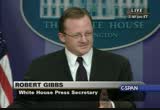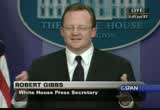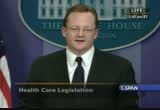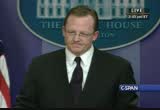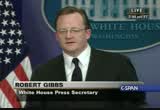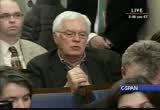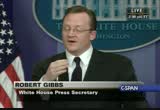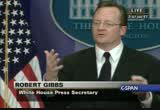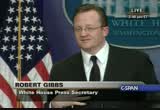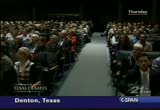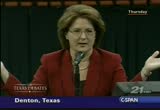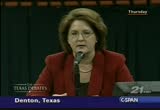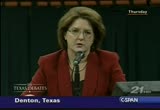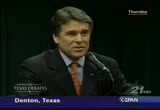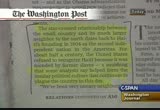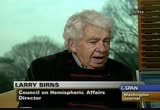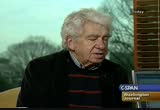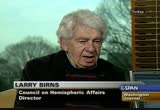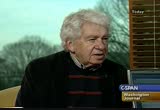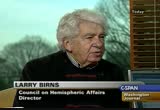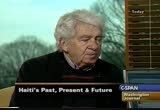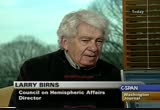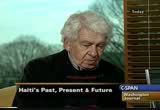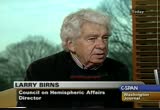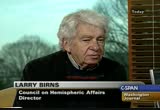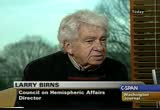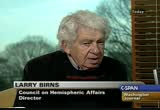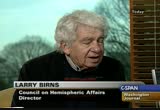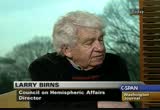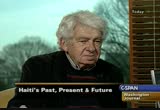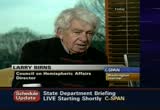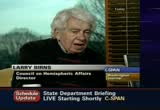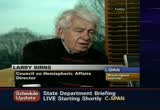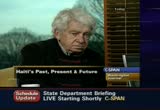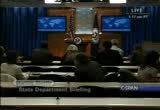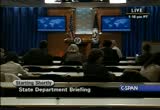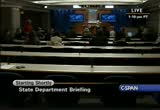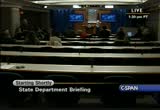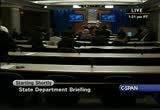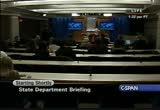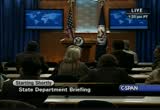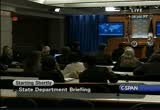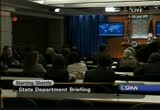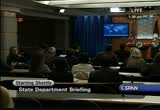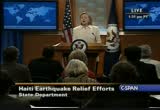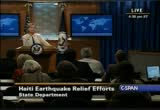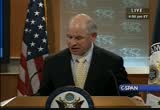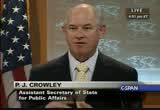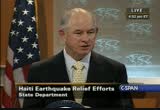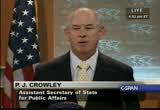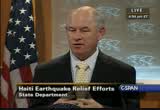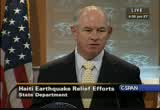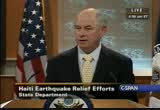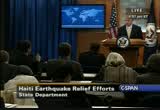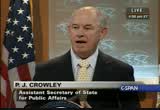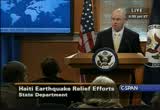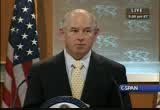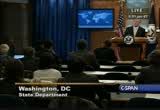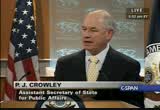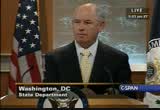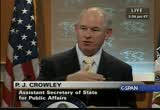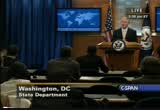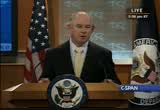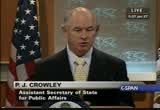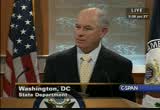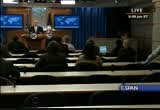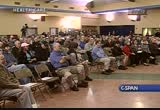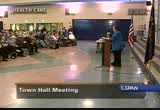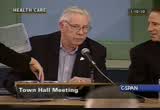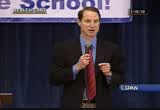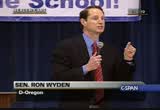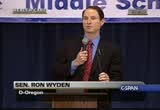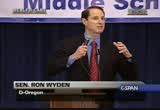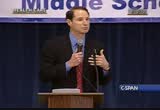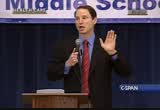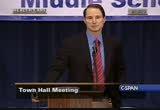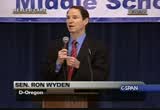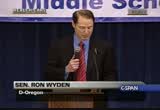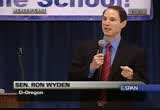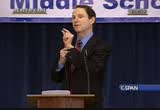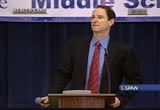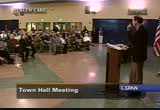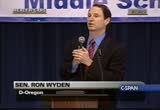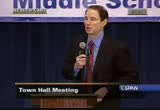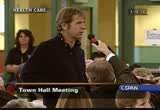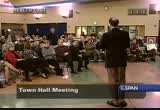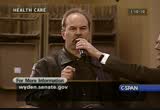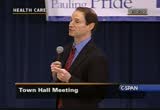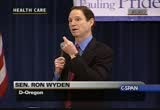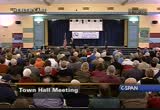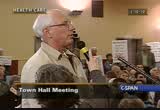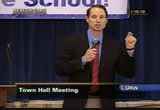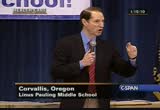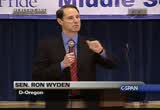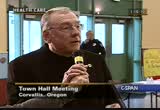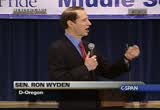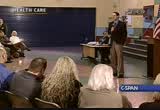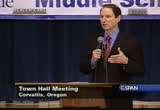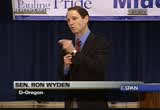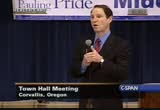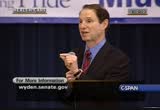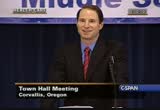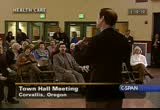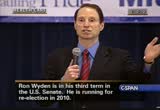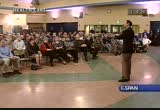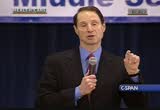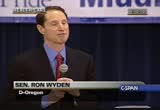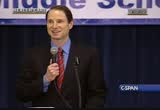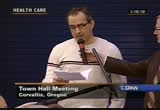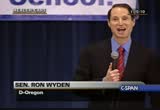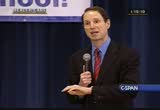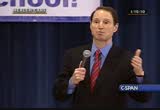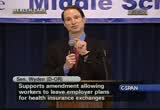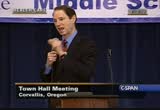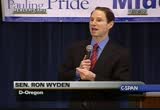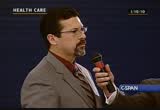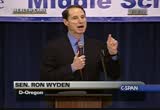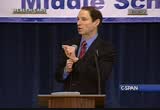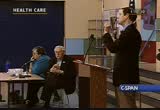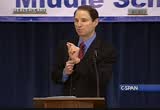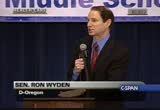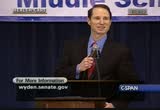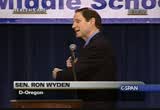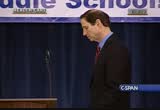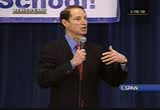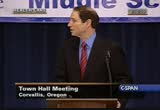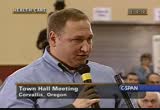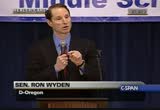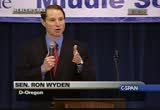tv U.S. House of Representatives CSPAN January 15, 2010 1:00pm-6:30pm EST
1:00 pm
work visas. granting it would be one thing and getting a job is something else. at think our country should be very proud to see that we are reaching out and showing them. it is very refreshing to see this rapid response and coordinated effort. president bush and bill clinton getting together who are good people who could go out in the community and gets the money to help them. i am proud to see this. we should be very proud of our country, reaching out and showing support and doing what we can. it is a good moment to see. .
1:01 pm
1:02 pm
caller: yes, i am. i came over as a kid. we fought alongside the americans in savannah, georgia. we share it -- we shed blood for this country. what mr. robinson said last i was really offensive. -- what mr. robertson. we send money back to haiti every year. there are 55,000 families that are affected by that. it is about 24%.
1:03 pm
we said about $2 billion every year. we pay our taxes and are good citizens. you can see by looking at the people like wyclef jean, the guy playing basketball, the political director of the white house. we are contributing to society. host: much money do you personally send back? is that nationwide how much patience brink -- send back to haiti? -- is that how much haitians send back? caller: myself i collect money
1:04 pm
from people for political education and civil society groups. four times a week i do training via skype to organizations. we are all doing our best. i think by allowing them to give $10,000 deductible for five years that we can build together people like bill gates, warren buffett to give money to the foundations like mr. turner from cnn. if people like that in cooperation start to really put together a global fund for haiti -- i am thankful for the
1:05 pm
government's, for president obama, religious organizations -- host: we're going to give out more figures from the newspapers. this is from a "the washington post." the administration requested to the $92 million in aid for haiti including $33 million for improving government services and $62 million for economic growth. orlando, fla., on the independent line. caller: geographically in haiti is right on our doorstep. the issue is to get the supplies there as quickly as possible to the suffering people. it has been three days. i understand the airport is congested and there is destroyed infrastructure. i believe that there is an aircraft carrier coming with helicopters. host: yes, according to a "the wall street journal," is another
1:06 pm
aircraft carrier on its way. caller: this was a war maneuver, believe me, that aircraft carrier would have been there. the supplies would have been lowered down to the people. i have one more comment. the caller from arkansas that says it is not our responsibility to foot the bill, if he is a christian what about being your brother's keeper? is it more convenient to cherry pick? host: leesburg, va., on our life for democrats. caller: first, i think we should write off the pat robertson comment because we can agree in this situation we need to help the people out anyway. theñr country was in pretty bad shape. watching a report on how prisoners escaped and there are massive gangs. it has the possibility to risk
1:07 pm
all of the relief we are sending. the effect is reduced drastically. i'm not suggesting martial law, but i think we need to secure some major areas like ports to get supplies in but to make sure the humanitarian aid effort on the ground is secured. i think that is just as important as sending money. host: the man in charge of international development speaks at the state department news conference and has been in haiti. on the republican line. caller: i think it is a tragedy what happened in haiti. if i was in a foreign land or another state and buy a home was destroyed, touching on the haitian immigrants that are here, if i got news the first thing i would do was prove it would be to go home.
1:08 pm
the most valuable resource right now in haiti is manpower is to help save lives and rebuild. the haitians are not going home. just one more point. host: the airport is closed there. the haitian government is not allowing any more airplanes to come in because they do not have enough fuel to get them out. the port is damaged. they're having a hard time getting ships italy as well. how would you expect haitians to be able to go home at this point? caller: most of them came here by ship. i'm sure you can still get there by sea. what are the natural resources, if anyone knows, that haiti has? what is going on there politically that is keeping the people there in such poverty?
1:09 pm
>> we will take you live to the white house now. >> good afternoon, everyone. i wanted to make a brief statement on the labour situation in haiti said the american people are up to date. this morning i spoke with the president of haiti who has been in regular contact with our ambassador on the ground. i expressed to him by deepest condolences for the people of haiti and our strong support for the efforts under way. like so many haitians, the president himself has lost his home and his government is working under extraordinarily difficult situations. many communications are down and people remain unaccounted for. the scale of devastation is extraordinary as i think all of us are seeing on television and the losses are heartbreaking. i pledged america's continued commitment to the government and
1:10 pm
the people of haiti and the immediate effort to save lives and deliver relief and in the long term effort to rebuild. the president and i agree that it is essential that these efforts are well coordinated among the united states and the government of haiti with the united nations which continues to play an essential role and with the many international borders and aid organizations now on the ground. meanwhile, american resources continue to arrive in haiti. search and rescue efforts continue to work pulling people out of the rubble. our teams have saved both the lives of american citizens and haitian citizens often under extraordinarily difficult situations. this morning, the aircraft carrier, the uss carl vinson, a ride along with helicopters that will be critical. they are preparing to move badly needed water, food, and other lifesaving supplies to priority areas in port-au-prince. food, water, and medicine
1:11 pm
continues to rise. at the airport, help continues to float in not just from the united states but from brazil, mexico, canada, france, colombia, and the dominican republic among others. this underscores the point i made to the president this morning. the entire world stands with the government and the people of haiti for in their devastation we all see the common humanity that we share. as the international community continues to respond, i believe america has a continued responsibility to act. our nation has a unique capacity to reach up quickly and broadly to deliver assistance that can save lives. the responsibility obviously is magnified with the devastation that has been suffered so near to us. haitians are our neighbors. for americans they are family
1:12 pm
and friends. it is characteristic of the american people to help others in a time of such severe need. that is the spirit that we will need to sustain this effort as it goes forward. there are going to beat many difficult days ahead. so many people are in need of assistance. the port is continuing to be closed. food is scarce, roads are damaged, water is scarce. it will take time to establish distribution points to insure things are delivered safely, effectively, and in an orderly fashion. and with the people of haiti to know that we will do what it takes to save lives and help them get back on their feet. i want to think our people on the ground, our men and women in uniform who have moved so swiftly, the civilians and embassy staff, many of whom suffered their own losses in this tragedy, and those members of search and rescue teams from florida, california, virginia who have left their homes and
1:13 pm
families behind to help others. to all of them, i want you to know that you demonstrate the courage and decency of the american people and we are extraordinarily party. i also went to think the american people more broadly. -- we are extraordinarily proud of you. we have shown compassion already donated millions of dollars. i encourage all of you who want to help to do so through white house.gov to learn how to contribute. tomorrow i will be meeting with president clinton and george w. bush here at the white house to discuss how to enlist and help the american people in the rebuilding effort going forward. i would note that as i ended my call with the president of haiti, he said he has been extremely touched by the french ship and the generosity of the american people. it was an emotional moment. seeing the devastation around him, he passed to this message to the american people. he said, from the bottom of my
1:14 pm
heart and on behalf of the people of haiti, thank you, thank you, thank you. i told president we realized that he needs more help and his country needs more help, much more. in this difficult hour, we will continue to provide help. thank you very much. >> more briefings coming out. follow them on line on in c- span.org. the state department earlier today, the first of a few briefings with the head of the u.s. agency for international development and they will have another one later today. this runs about 30 minutes. >> today, food, water, shelter,
1:15 pm
and medical support our flying to haiti. the arrival of the uss carl vinson allows us to expand our ability to deliver the vital assistance to the people of haiti. as we are delivering the assistance, we are bringing more and more americans from haiti off of the island. even as we are focused on this disaster response, we are also focused on the longer term and how to sustain this relief operation over weeks and months and how, ultimately, the united states working with indian -- within the international community will help them rebuild. to help provide some perspective on what we are as facing today and to also give you a sense of the longer term challenges, we again have our counselor to the secretary of state as well as our administrator.
1:16 pm
>> good morning. first of all, i want to start off by saying that our commitment to haiti is a long and deep one. it is one that president obama spoke about that will not only be in their hour of need but for long term. that is something that he just reiterated in a conversation that he had with the president of haiti not long ago. the spoke about not only the need for at an immediate recovery but also long-term. secretary clinton has been focused on that here at the state department, the commitment to being a partner with haiti is they were building towards economic growth and sustainability. haiti is not only our neighbor but we have a unique and special relationship with them. the needs of haiti have also been needs that have been larger than needs you would anticipate in such a small space. we have been focused on
1:17 pm
thinking about ensuring the long-term sustainability of their agriculture, health sector, energy, as well as being effective partners with them. we will continue to think in this moment of crisis about how we rebuild for the long term that we do it cognizant in the ways that we can catalyze the ways of economic and sustainable growth that is rightfully part of haiti's future. that is a commitment we will continue. xdwe would have been coordinatig with the government. our message has been in touch with their president and the prime minister. they have met several times yesterday. they have already had one meeting today. the regular contact is a line the kinds of things that needs to get done and the leadership the government is able to assert to make sure we're acting consistently with their immediate goals and needs the working in a partnership with the international community that ensures the kind of coordination that is critical at this moment given the number of
1:18 pm
countries, disaster in assistance to disaster assistance and relief organizations, and the people on the ground that are in need and providing support. the un has arrived and we're committed to supporting them in their role in the disaster assistance and the role that they provide in providing long- term security in haiti. the minister has been there for quite some time. -- the minutia has been there. the secretary also called today to express our condolences to the family of victoria delong who lost her life in this terrible situation. we are, of course, deeply saddened by not only her loss with a loss of many, many lives of those who work in haiti. i want to take a moment to say
1:19 pm
thank-you to the american people who have been unrelenting in the amount to support the have shown with respect to the portal we set up for donations to be made. for those who want totext, h-a- i-t-i which has raised more than $9 million for the red cross. we hope that will be put to great years. we want to thank those who have made those incurred trends -- those donations. to speak further, i will turn to my colleague the ambassador. >> hello. i wanted to provide an update building on the points just raised. the conversation the president had with the president of haiti is a clear demonstration of the partnership that we have, at that level, and at all levels.
1:20 pm
many of our disaster system responds that is on the ground have had continual contact with different ministries within the haitian government with different levels of the government there and with it the human colleagues said that we can pursue our work in a swift, aggressive, and coordinated manner. i wanted to provide an update with the leadership of our work in haiti. also on our search and rescue efforts and introduce the major components. our disaster assistance response team led by tim callahan is in the process of being doubled in size. would to make sure they have resources and the capacities -- we wanted to make sure they have the resources and target being able to put assets and targets in the hands of those non-profit organizations and other types of entities on the ground that can deliver those services to people and do that in an effective way to make sure we
1:21 pm
are covering the effective -- effected areas. our urban search and rescue teams, there are 24 teams actively engaged in search and rescue. most of those teams have between 70-80 individuals. four of them are from the united states. the fairfax, va., team was the first on the ground. and in providing leadership to make sure this effort is coordinated. we continue to send additional capabilities and will continue to send teams. our belief is now there is a significant urban search and rescue efforts underway that is still attempting to save lives. there is still an important open window of time today, tonight, and perhaps tomorrow when we have the ability to save lives. these are haitian lives, american lives, and the lives of the people on the ground. we are also mounting a major
1:22 pm
relief operation which has been in planning since the beginning of this crisis. we are mounting this operation in close coordination between fema, usaid, a number of other civilian agencies, and the department of defense. they now have the aircraft carrier there which will dramatically improve our capabilities to provide critically needed commodities and server support to the ngo partners had directly to the haitian public as necessary. there are about a few important principles that i wanted to highlight occurred -- highlight. our first goal is to meet basic needs like food, shelter, water, shelter -- tarps. as with our urban search and rescue operation, we want this to be deeply coordinated both across civilian and military
1:23 pm
assets of the united states and, even more importantly, across all of the deferred relief efforts taken -- taking place with other countries and organizations. we have been active in staying connected with those partners. third, we want this to be the groundwork for a sustainable, wii development -- re- development of haiti. we have had a longstanding an important relationship with haiti with significant financial flows and a significant partnerships to improve the development and health outcomes for that population. what to do things now to lay the groundwork for being effective in that area in the future. forth, we want people thinking out of the box. in the next few days, we are confident we will be able to provide the traditional channels distribution,n -- distribution, ngo partners and
1:24 pm
others. we're working with those partners and trying to ask, and we want to think so many of them, for really being creative in thinking about how they might do things differently to expand their reach and expand their ability to reach of the affected populations which will continue to be very important. i would like to run through a few quick numbers to provide a sense of scale. on food, we have mobilized and have an routes 600,000 humanitarian daily rations provided via the aircraft carriers has the mechanism of entry. in addition, we have mobilized $40 million of the food assistance which will be enough food assistance to provide several months of food for the affected population of two million individuals. in addition to that, we're continuing to work with the world food program and other
1:25 pm
partners to mobilize even greater capacities to improve local milling efforts and other efforts to make sure that haiti has the food it needs now and into the near future. on water, we are in the process of mobilizing 100,000 and leader collapsible containers -- 100,000 10 liter collapsible containers. that is limited especially in public health. 20,000 of those will arrive today as part of the initial list of commodities on its way. we have four major water purification systems identified plus the production capacities of the military assets on the ships that will be there. we are confident we will be able to improve that situation. we have six more that have been identified in the other facilities that usai submittedd
1:26 pm
is around the world and river mobilizing them -- that uiaid has identified. we're working on shelter, blankets, tarps and working with partners on the ground to identify how those can be deployed. we are confident we will have the ability to send significant commodities, materials, supplies and we are working with our partners to identify the very best ways to make sure they're distributed infected population. thank you. >> i have a question about the figures you just provided. it sounds like this is what you intend to do starting today in terms of delivering water and food. has nothing been delivered up to this point, and why not? >> we have already had deliveries from the very beginning of this effort. this is a different scale of that. initially, we have limited capacity to send things into
1:27 pm
haiti and made are in the prairies saving lives in. urban search and rescue and the operation to save lives was part of that immediate effort. now have military transports in the distance capabilities. we have support and cooperation and partnership with the airport and a number of other transport routes we were working on to expand the capacity to send more. this has been under way. the minute this happen, all these things were mobilized. the reason we can start this is that we did not hesitate one moment in really unloading the vast majority of our stocks and assets to make sure this could get there as soon as possible. >> is the military really disturbing these materials or is it going through the ngo's? >> transport and logistics to get there is a combination of the civilian, charter, and military capacities to get there. it is really what is most effective.
1:28 pm
in terms of distributing, we will first work with partners and ngo's to reach the population and then push into direct delivery and a range of other solutions consistent with our partnerships with the human and other actors on the ground to make sure we do that in the smart and coordinated way. >> which areas and what are these areas, the badly hit areas? how soon will be getting the relief? >> i have been away from my desk for 90 minutes so i am not sure what people are getting. tim callahan is the response team leader on the ground that is coordinating that with the military. people have been receiving a series of relief items from the united states. this will expand the capacity dramatically. it today, there will start receiving many of these items as we start getting them into haiti.
1:29 pm
>> ignore the past 90 minutes. how many patients have received american aid so far? what areas have been receiving them and what have they been receiving backs >> i would have to come back to you with specifics. army the party up to now, and it continues to be, the urban search and rescue effort. that has been the immediate effort. we have been coordinating, we all see the voters of the commodities are arriving at the airport and we have been coordinating and distributing that with ngo partners. >> tim callahan will be briefing today with the ambassador at 2:00 p.m. and we anticipate being able to address those questions. >> that is 2:00 p.m. our time. >> just a quick question for the administrator on the search and rescue efforts. can you tell us how many actual
1:30 pm
local haitians have been rescued? there has been some criticism on the ground among locals the the search and rescues are targeting foreigners, the wealthy, that kind of thing. also, an update on what the secretary has been doing. >> from the very moment we sent the first team in, we sent them with direct guidance to reach haitians and to make saving the haitian lives a priority along with saving lives of u.s. citizens and of looking at the u.n. complex to tracing the people who could help coordinate and lead this effort going forward. i do not have specific numbers on the number of patients who have been saved. with 24 teams working, this is very, very hard work. we were tracking the first team when they worked overnight to save one life and it was a tremendous achievement. he spent six-seven hours going
1:31 pm
through the rubble and cutting through layers of concrete, sending in water to help support the judge when. it is long, hard work and i do not wish to create expectations that these teams can go out there and be wildly successful. these people are taking tremendous risks and this is very difficult work. they worked around the clock. the situation they are in is very tragic and very difficult. the >> circuitry clinton did cut her trip short. she has been spending a lot of time on the phone with other ministers speaking of the critical need for the coronation we like to have and ensuring the kind of leadership the un and can actually provide is supported there. she has also been expressing her desire both here and in meetings with the president and others to ensure we have the kind of
1:32 pm
support and commitment necessary for this type of effort. she has been doing a fair amount and anticipates continuing to be on the funds, working the phones, as well as providing support to our government efforts. >> you say there is an open window to save lives. do you have any idea given unanimous the satellite imagery how many people are still alive down there? i am not saying you'll be able to save them all, but what kind of numbers are we looking at in terms of the number that possibly could be rescued? there is some talk about wanting to return to haiti by their former president. he feels terrible and wants to go back with his wife. given that he was such a design -- decisive figure in the
1:33 pm
country, forget about the security burden it would take for him to visit, but what is the u.s.'s position on this and have a set out signals through any officials in the building that now is or is not the time to go back to haiti? >> i do not think it is a program to try to guess or target how many lives could be saved. we have more than a 300 american professionals with equipment and capacities to do this work working around the clock in difficult and dangerous environments putting themselves at risk to really give this effort a full effort. we also have all the other teams that constitute the 24 total teams. i respect their commitment and they're full of her to save lives regress i was wondering how many people you think are still alive down there? >> that is very hard to try to address. >> we have been focused on
1:34 pm
trying to make sure we can provide the support and assistance necessary for the relief and rescue. we read in the media that the president made those comments, but we have not focused on them as much as we focus on making sure we are providing the support necessary. we are aware of that and will be taking stock of that. is there something more that we have in respect to that, i will make sure to get back to you. >> there is a perception that the u.s. is going back into haiti again and will be there for a very long time. at the same time, in recent years, there has been talk that brazil and a lot of american -- that american countries bring more to haiti than they used to. going forward, how is the obama administration going to make sure we are not seen as we colonizing the place considering the devastation? are you looking at haiti as a potential model for how the
1:35 pm
obama administration works with latin american countries given the president's out -- and his attempt to redefine that relationship? >> ayalon on elite lawyers answered that many multi fired questions. our commitment to haiti has been a long one. over many years, we have had a substantial amount of development, a, and commitment there. we're providing tremendous financial support to them as well as a larger scale development for the country. our commitment to haiti is a very long and established one and we anticipate that can read that to continue. in terms of the contract, we have been doing this in partnership with the haitian government. i work directly with their president and his ministers. we have been doing that in an effective partnership. the past 9-12 months in haiti
1:36 pm
has been relatively calm. they're committed to providing the leadership in that regard. they have laid out specific plans and strategies for how the international community can be a partner to them. in april, there's a conference where all countries came together to partnership with haiti and they have a plan. that spirit is the spirit in which people are writing today. they're not looking in any way to be anything other than a partner to haiti and ensure their long-term sustainability and success. for the haitian people and government, because they are entitled to that. in order to do that well, we can only do that in partnership and not by taking over. we have no intentions of doing so. >> i wanted to follow up on that. we do not want to be anything other than a partnerr. can you give a skirt -- concrete
1:37 pm
details on how you are working with them? who's the contact with the health minister? have the drafted a plan? are the haitians for writing the road map for recovery or are we are? >> i doubt in the last two days they have drafted a plan. that would be more than we could accomplish. i do think a few things. the haitians have been very clear with us and indeed one of the first things the prime minister laid out and the president reiterated was what their priorities were. there ambassador did the same thing. rescue assistance, medical supplies, communications, and help with their energy sector. they established those priorities. as a secondary matter, there are very clear in the president's -- in the presence of their president, he is the leader of the country and is confident in his leadership as are his
1:38 pm
ministers. some of the challenges that are being faced right now or cop -- are quite challenging because the communications structure and a lot of other structures are not present a. that does not mean they are not treating with our ambassador, but they're quite clear about 30 tendrils. -- quite clear about their needs and rules. we are respectful of that. >> could i offer one example? you raised health. usaid director mel with the health minister in haiti. the health minister requested that we help them begin the process of developing a hospital network in port-au-prince. as we came back and thought about how we could respond to that request, we identified resources that the department of
1:39 pm
youth and -- health and human services and sending it in a number of medical emergency assistance teams with replaced in the fiscal side is where the health ministry would like to begin to develop the infrastructure for a longer- term, sustainable held services provision sector. that is one example, but that is the way we hope to work in partnership and responsiveness to requests from their government. >> i wanted to follow-up on this. are there other ministries that are working? the police seem to not be showing up for work. it is the second airborne have the authority to arrest, to detain people? -- does the 82nd airborne have authority? >> the police have suffered a tremendous trauma and have no doubt lost family and others. just as any of us would be searching for our families, they are doing that, too. that is completely human.
1:40 pm
i also think it is important to remember that they have a long presence there. as a part of that team, there are a large contingency of officers that are providing leadership and we anticipate them continuing to provide that leadership with respect to the security of haiti. our people are there. military, civilian are there for humanitarian relief operations. >> been your experience, how long would you expect the u.s. military component to be there? going forward with the long term kapadia, are you envisioning a big scale up of civilian builders such as usaid? are we looking at a civilian search? -- surge?
1:41 pm
>> certainly as we do the planning, that is of guided by what are the assets and capacities that haiti needs to have said that these military assets can be withdrawn. for example, in planning the water support the goal is to consider how much water would we need produced by the ships that are down there? what can that do to help stabilize the situation in the coming days and weeks? what can we do in parallel to that to help build strong global capacity so that that is not necessary anymore? the goal for every sector we're developing is around how do you help build the local capacity with the local nonprofit organizations and under the leadership of the haitian government to make sure these emergency assets can go back. i think it is important to recognize that this is an immediate emergency.
1:42 pm
at the 2:00 p.m. briefing, tim callahan will be able to describe the extent to which there are significant, immediate needs. it is our responsibility. the president has directed us to be very responsive to meeting those needs in any way possible in this immediate time frame. >> would this be a period of weeks or months? but these are dependent on the earthquake. once we start building water systems and start answering health systems, that is ongoing. how long will this last? what's right now this is a operation. we will be assessing that carefully. our priority is to build the local capability so all these crisis assets can essentially be withdrawn. the development professionals at usaid . are very focused on how we do things that build the
1:43 pm
sustainable capacity? that is how we plan our thinking with the caveat that we are under direct orders and provide relief because this is a number does the situation. >> you talk about building up local capacity. are you talking about training for the haitian people? i am not really sure. when you rebuild you have to teach people to implement what you were putting on the ground. >> i would respectfully suggest that that concept is perhaps not as applicable to haiti. they have a bear resilience and capable population. i will give you an example. there are milling pass these to mill wheat. if we can provide equipment to get one or two of those plants running, they can mill in use their local food systems to distribute food and me needs.
1:44 pm
our partners can work to buy the food locally. that will not happen all right away, but we are already planning. the goal is to meet an immediate emergency response so people can eat and, at the same time, the groundwork for a sustainable agriculture and food system because that is what is most important over the long run. >> the image of the u.s. military around the world is one of the warriors. but you have a disaster of this magnitude, it seems the military is asked to play a vital role in saving lives and in rushing assistance to people who need. i wonder if you could take a moment to talk about what the military is bringing to this operation and what it means to the whole operation. >> the military has been very much a crisis operation. they bring a full range of assets and capabilities including the satellite imagery
1:45 pm
that i discussed earlier that we hope will help inform the capacity of our disaster assistance team to do things in a strategic manner to the transport and logistics that got many of our urban search and rescue teams on the ground managing in supporting the operations of the airport so it can be efficient and have a high throughput. we're providing transport and logistics support for much of this relief operation. it is a significant set of capabilities, not to mention just the partnership with the department of defense leadership in considering what are the best strategies to meet the immediate needs and do that in the way we're -- way where we are clear. >> a point of clarification. are you saying the military role
1:46 pm
will not be a security role? >> i think two things. as a practical matter, we're focusing on the assistance and relief. we will look to the un for whatever support is appropriate and we will provide that consistent with the leadership provided on the ground. our immediate mission is to provide actual disaster assistance relief. that is what we are a dissipating. >> are you ruling out that the u.s. military could play a security role? >> ruling in or ruling out anything would be premature because we have no assessment of the frame. our expectations for our team is disaster assistance relief. we have a very strong security component on the ground in the un team there. the have played a strong leadership role effectively in haiti led by a brazilian commander. we anticipate them considering
1:47 pm
that role. we do not think that is a world we will provide, but we will provide whenever necessary. >> i want to follow up on that. in a general sense, everyone has seen the pictures of some looting, people running around with machetes giving a sense of a disruption and a security situation. if the un is playing that role, it is obviously not totally effective everywhere. i am not sure it ever was, but it does not seem to be now. i want a sense of how worried you are about the security situation and how worried you are about it getting out of control? >> i would take exception to the fact that the statement that the un had not done an effective job in providing stability in haiti. that is one thing they have done quite well so i would like to be transparent about the
1:48 pm
government's experience on that and my own observations with respect to the role they have played there in respect to security. i have not had the opportunity to see some of the images you are speaking of. i'm confident image as i that will always exist in moments like this. i do believe we have large scale, and order. we are committed to providing them with whatever support is necessary to kenya -- to make sure they continue to provide that role. >> is this all going to go through u.n. agencies or are they going to take the lead in deciding what is going on? will it be a parallel structure? that is a fairly big and efficient organization. however going to balance the civilian in -- and the non-u.s. the decisionmaking process with
1:49 pm
that when you have the machine exists to go out and do these things? >> the first and most important is the way we coordinate with the government of haiti. as you have seen from the events in the recent day, the coordination happens at every level. it is deep and will continue and we are committed to that. as i suggested with the example in the health sector, we want to work in that manner. second, the coordination of the rigid disaster relief effort which includes all the different countries in the great generosity of some many organizations. at coordination we anticipate will be led by the un and we will work in close cooperation by them to make sure they have the capacity and the support to do that effectively. on the military side, as we have addressed, we work in cooperation and in support of the un troops. there have been present there and have been there for a long time and have relationships and
1:50 pm
those a leadership roles. we intend to slide under those rules and to work with the un and the government of haiti. >> what is the connection with the haitian police? there was a new organization helps set up? >> we work under the authority of the un troops. >> thank you very much. >> we will be back to the state department later today for a 4:00 p.m. briefing. we are waiting for robert guess and his update -- robert gibbs. according to 80 sources, obama will visit massachusetts.
1:52 pm
1:53 pm
for 4:00 p.m. in of a number of questions about haiti relief efforts. earlier today at the white house a short while ago, president obama mentioned that he has reached the haitian president in a telephone call which is the first conversation they have had since tuesday's earthquake. their report that a moderate earthquake has shaken eastern venezuela. çóso far there are no immediate reports of injuries or damage.
1:55 pm
1:57 pm
[no audio] >> we expected the briefing to get under way. when it starts, we will have that life. earlier today, obama said he had spoken with the haitian president for the first time since the earthquake. the associated press reports that the un secretary general says that to 50% of the buildings in their capital and other areas hard hit by the earthquake haveñiñi been damager
1:58 pm
1:59 pm
2:00 pm
2:01 pm
on monday, the president of first lady will the debate in a service activity in the washington area and in the evening the president of first 80 -- lady will attend the let freedom ring concert, a musical celebration of dr. martin luther king, where the president will also deliver remarks. on tuesday the president will attend meetings at the white house. on wednesday the president will host an event that the white house and honor of national mentoring month. on thursday the president will meet with a delegation from the u.s. conference of mayors at the white house to talk about strengthening the economy and creating jobs in communities large and small across america. on friday the president will travel, as we previously announced, to loraine, ohio, on the next out of the white house to meet strict war and he will hold a town hall at the lorain county community college with workers, business leaders and small business owners for ideas on continuing to grow the
2:02 pm
economy and putting americans back to work. one more thing before we take questions. çççmartin of the king. how are we doing this? the website -- this is the website that is now active for people to donate on behalf of the relief and building efforts of haiti that is being coordinated by former president clinton and former president george bush, georget( w. bush. that will be the centerpiece of the event here at the white house tomorrow. as soon as we have details on the timing of that, we will ensure you all have that to appropriately plan your weekends. >> barney frank says that if brown wins on tuesday health care is dead. you agree with that?
2:03 pm
>> i don't think scott brown is going to win tuesday. >> it is looking like you might be wrong, so what are you guys doing to prepare for that eventuality and what do you think the chances of the health- care bill passing our? >> look, the president has spent a lot of time over the last few days working through the few issues that remained between the house and the senate, to get an agreement that can move this legislation forward. çhe was here until late last night, and they are back in the room today, right now, continuing to make progress. that is what we're doing to get health care through. >> getting a deal is somewhat separate from getting the votes when it goes to the floor. that is what this election could drastically impact. >> we will have time to talk about what happens next week.
2:04 pm
>> you think the election on tuesday as a referendum? >> i think one of the reasons the president accepted the invitation from the campaign to go, the president sees a pretty clear distinction of a candidate who will fight for massachusetts and the candidates on the other side who feels comfortable fighting for the insurance industry and big banks. >> is it in some ways a referendum on the healthcare bill? >> i think it is a referendum on whose side you're on. >> a lot of the polling suggests the problems democrats have had in places like new jersey, virginia, as well as massachusetts is based on public dislike of what they perceive to be the health care plan. is it getting any traction in places like massachusetts? why -- you've got a candidate who was perceived to be a runaway, walk away winner who is now in danger of losing.
2:05 pm
>> that is why we have elections. we are not on the balanced -- ballt. there is a campaign in massachusetts and we are happy to lend our support. you heard the president say yes today we will get health care done and we would be happy to have a campaign on whether you are for the status quo, whether you are for protecting insurance industry profits, whether you are for protecting bank company profits or on the side of the american people. we would be -- will be happy to have that -- >> of the people are not buying that. you think the president can go turn it around? >> i thinkç the president believes he can beç helpful and is happy toç accept the invitation. >> robert, the state department is issuing a formal diplomatic expression of concern to china. what does the united states need to hear to placate its concerns
2:06 pm
and how do you keep this incident from hurting u.s.-china relations? >> as i said it yesterday, you heard the president in shanghai address is believed in universal value of a freak internet. -- free internet. we don't carve out our values based on what country we are talking to. obviously, as i said yesterday, and the secretary of state said previously, we have concern over events that have been written about. we wanted to and needed to hear from chinese officials about them, and that we supported the efforts of google to stop censoring their searches in
2:07 pm
china. i think that has been our posture and i think that appropriately stems from our belief in a free internet. >> you said a lot of that yesterday. but my question today is the chinese of our has played down the concerns and what are you looking for? >> i am not going to get into specifics. >> what do you need to hear? >> an explanation. i think people want to hear -- we have been briefed, others have been briefed, on what google experience. and as the state department said it, we need to hear now from the chinese. >> is there a next step you are discussing once you get feedback? >> look, i am not going to get too far in the future on this. ççobviously we are anxious tor
2:08 pm
from them and i think in terms of google, they will keep us apprised on their next steps. >> can you share with us how the president feels the relief and xdrescue efforts are going? i know he was in patients early on, not understandingçxdç mor- why more has not been done. how is he feeling these days? >> i think as you heard the president say today, he is pleased with our efforts to -- at moving resources to the airport, moving resources to haiti. i think as you heard the president say -- and your reporters on the ground will certainly attest to this -- there are going to be tremendous logistical challenges to moving throughout the country and certainly throughout the capital. simply because the damage sustained in a such a devastating earthquake.
2:09 pm
one of the things the president's -- and secretary gave an and moral mullen discussed a few nights ago,w3 -- secretary dick and admiral moeller and to make sure we have -- uss vinson has 19 of those helicopters on site. when things are ready and capable, we now have much greater list of ability to move resources from staging areas either at the airport or other places overland from the dominican into areas that needed the most. i think obviously we are in a very critical period and i think you are going to seat -- we are entering a very difficult situation in the logistical moving of those resources.
2:10 pm
and i think that is what the president has asked southcom and others to help assist. >> some reports on the ground are saying that there are haitians that resent the fact that u.s. efforts seem to be focused a great deal on rescuing americans, where so many haitians are suffering and need rescuing as well. i know it is a difficult balance for the u.s. to arrive at. how are the decisions made? >> i would say this. i think the present discussion with president preval sums up the feeling of the haitian people and i am sure it goes, quite frankly, to the entire international community. there are going to be, like i said, a number of logistical challenges that many of the
2:11 pm
countries will face in the next coming days to get all of this distributed. we understand that and they are working through the logistics as quickly as we can get i would point you to you as a id or dhs -- u.s. aid or dhs for specificity. >> now that the details of the deal with the labor unions was made public, why is it fair for individuals who have so-called catalog -- cadillac plans negotiated through collective bargaining to be exempt until 2018 from the proposed excise tax, whereas those who may be in the exact same situation not part of labor unions, even though they want to be an accompanying existed or maybe in right to work states, why is it fair for one group to not pay the tax and another to pay? >> i have asked for to see what numbers they can run. we are talking about an
2:12 pm
exceedingly small number of people. i think the premise of your question would impact. well, it is 40% tax on the insurance company for the excess of their policy over the threshold, right? so, the new threshold is $24,000, right? >> if it was not a big deal the labor unions would not have pushed so hard to be exempt until 2018? >>ç it is not a 40% tax, but it is above the threshold on an insurance company but not an individual. >> not an inconsiderable tax. >> i would say that obviously there is, just as it is for the insurance fee, just like the fees on manufacturers and other businesses, there is a phase in over a five-year period of time, just as there is -- the administration did not believe it was any -- made any sense to treat business and industry and
2:13 pm
insurance companies differently than they treat workers. >> just a follow up in terms of labor unions. the final negotiations seem to be basically the president, democratic leaders, labor unions in private rooms here in the white house negotiating. how does that squarw with the president's promise to put the negotiations public question of >> we discussed this -- >> now we are seeing it play out. labor unions thing we want this and no other stakeholders at the table. >> again, i will refer you to the transcript couple weeks ago. >> why is the president having a hard time getting democrats excited about his agenda? virginia, new jersey, massachusetts -- this is the problem. there is clearly some apathy or something going on with the democratic base. why do you think that? >> look, i think some of it has to do with individual races and individual circumstances.
2:14 pm
off year races, as you know, chuck, and special elections are a far different breed than regularly scheduled elections in even numbered years. >> but there is enthusiasm against you but there seems to be no enthusiasm for your agenda. >> of the president is looking forward to going. i think there seems to be a lot of enthusiasm around the discussions being had of their right now about whether we are going to ask banks to pay the taxpayers back the money that was loaned or not. i'm pretty sure there will be excitement around the that. >> one of the messages he will get out? >> i am certain that will be one of the things he will speak about. and a haiti question, is there a planning phase of what to do with haitian refugees?
2:15 pm
house these folks temporarily if they cannot be housed in haiti? is it something the government is discussing, is there planning going on? >> we are still in a search and rescue operation. i do not know specifically from the u.s. aid in terms of temporary housing in haiti. i can certainly see what they have on that. look, obviously i think it is going to, as a said earlier, it will take quite some time to move resources. the other country saying, we might take some folks -- >> certainly they moved in medical cases to the dominican republic. we've got an additional ship on the way to deal with some of the stuff. i think all of this stuff is going to be sifted through as we
2:16 pm
get deeper into the week. probably in the next few days. obviously in that shorter window of time, it is our real and genuine focusçç onspp)ch and rescue. >>ç i did notç quite fit your answer to jake's question,w3 wee you trying to suggest union members did not get a special arrangement with the health care deal, that their plans to not have a special benefit by delaying taxes until 2018? >> only if you think the insurance industry fee that phases and between 2011, and 2017 -- i alluded to this yesterday, keith. as there are not a lot of big pieces of legislation, there is a transition period would -- period for how things are done. there is a fee on medical device manufacturers that is phased in over a seven-year
2:17 pm
period ofi]ç time between -- to 2018. and insurance 8 days then on the insurance industry from 2011, until 2017. -- and insurance the that phase in. >> u.s. saying it is comparable to other groups? >> i am saying we are treating workers just as industry, business, and insurance industry. >> but the ones who are not and the unions. but not right. we discussed the very slim number of people. >> aren't these essentially gives to special interest groups? didn't what we have an white house were typical negotiations with the special interest groups? the unions -- >> transition periods for how different things are treated in the bill. there is a transition period in dealing with the insurance
2:18 pm
industry, in dealing with a number of phases, aspects that have to be phased in as a part of this bill. >> essentially union officials got their pound of flesh, too. >> if you have an answer to the question. >> there was a promise not to have special interests and the white house to influence legislation. >> the question is, it is it fair that some are exempted and some are not even though the number of those not exempted and the initial five-years is a slim #? >> we believe that agreement is structured in a way that is fair, just as it is fair to other aspects of the bill that have to be phased in. >> on haiti, president obama said in addition to short-term rescue and relief he was committing the u.s. to long-term rebuilding. can you elaborate? >> obviously, as i said earlier,
2:19 pm
we will get into that in the coming days and weeks. obviously, as mentioned yesterday, going back many administrations we have had a stake in the outcome of haiti, not just in our administration, not just in the administration of george w. bush or bill clinton or even his father -- not bill clinton's father, but george bush's father. for a long period of time we had a stake in that. and obviously we will continue to have a stake in that in dealing with the tremendous devastation. >> following up on chuck's question, does the white house support either senator lugar are possible also to let haitians of the u.s. spot -- overstay their bases by 18 months or expansion to let the command? >> talking about tps. >> tps. >> i would directlyxd youç to e
2:20 pm
department, security that might have more information on that today. >> where did the negotiations stand on abortion. >> i did not know if that is a topic that working on now but i know, as i said earlier, i think that 1:30 p.m. they convened again to go through the differences. >> what about the insurance exchange proposal? >> i did not know if theyç have come to an agreement on that as well or not. i think they have been there in late last night and again today and as soon as we have stuff that is locked in we will let you know. >> we would not have to ask you -- but we are on c-span. >> can we pool its? >> how about a pool. >> robert, you told us when asked earlier this week the president was not going to massachusetts. what changed? >> he got -- >> that is all that changed? he did not think that's the
2:21 pm
prospects are better now and the president can be productive in this trip and the negative consequences if she loses? >> i think the president believes it will be productive stop, whether it was announced on tuesday or now. we have an invitation from the campaign. >> you never had one until today? >> that's right. >> how much has the president indicated to you and others to the vote in the scheduled next week to haiti? is this something you are building and every day for the next week, next couple of weeks? give us a sense of how he indicated his personal involvement will continue? >> major, he wants to continue to be updated on our efforts. obviously some portion of his daily intelligence briefing, is dedicated to the situation in haiti. he continues to receive written updates throughout the day. i don't believe they were in the
2:22 pm
situation room last night. i think you received another lengthy paper briefing on that. as we described the meeting in this situation room a few nights ago, that the president believes it is -- our response to this is important for who we are as a country, for who we are as a good neighbor and for the american citizens who are there as well as haitians who had to live through the devastation. >> i talked to former president clinton this morning and he said the next seven to 10 days could present tough things for americans to watch despite some of the most aggressive efforts. he said there could be looting, there could be people literally dying in public, not because no one wants to help but you cannot move things. he said the country should be prepared for veryç difficult things to say -- c. does the president agree with that and is there anything he
2:23 pm
will do to help the country understand that although the u.s. government is trying to help others are -- >> i think in some ways he alluded to the little bit of this in his remarks today. obviously -- and i have discussed and he discussed physical challenges of the devastationt( and the challengen taking resources that are arriving at a fairly steady rate at the airport and distributing them throughout the country, particularly the capital. a lot of you all have sent folks down there and people have driven from the dominican republic --i] i saw somebodyç o said it took them 10 hours to drive. look, i think there is no doubt there are a tremendous number of these challenges that we will see more and more of as we get deeper in the weekend and certainly into next week.
2:24 pm
pictures have been easy to watch. and i do not think they will get easier to watch. obviously as we get farther away from the initial event, we will have greater information on the toll in human lives. we will see the physical strains of having to try to move resources. i can assure you that the president has asked secretary gates and admiral mullen to do everything in their power. i think the capability that arrives from the uss vinson and 19 helicopters is a good start. we have security at the airport, and hopefully with some smoothness we will be able to get resources in it and deal
2:25 pm
with how to get the resources distributed. i did not have any doubt that it is going to be a tough weekend in terms of what i think everyone will seeç, exceeded greatly by how tough it will be in haiti. >> on health care, there are revenue implications to this arrangement made and announced yesterday. i know that everything is today -- you said the white house is not committed to the figure. but is the president committed to recouping every dollar? and a fairness question, not just apply to those exempted but where the revenue is coming from? why should those already -- i presume wealthy america, already facing higher taxes, medicare and otherwise, being asked to pay for that additional -- setting aside something that unionized workers will not have to face for an additional five years? >> i think some of the revenue questions are obviously part of
2:26 pm
the discussions that are ongoing. the president has made a commitment that he will keep to ensure that this legislation is fully paid for. again, it is something that is a little different that is going on in washington these days. this is a proposal that will be scored and it will be rendered a judgment as to the fact that the president will pay for every ççdime in this bill. the compensated for in taxes for additional medicare savings? >> again, i think some of the discussions are ongoing. >> on healthcare, the last month or six weeks you all have proceeded with no republican support, no republican negotiations as far as anyone can tell, 60-40 votes. and it looked like you were on the glide path to passing it in the senate's with democratic-
2:27 pm
only boats. you now faced the prospect in çmassachusettsç of possibly needing a republican vote. is there some regret that there has not been that sort of effort -- a month that more republicans have not worked with the white house? a good -- >> that more republicans have not worked with the white house? a good question. >> how would you guys a restart the discussions with a handful of republicans you think might be able to be -- is there any prospect of that? >> look,çq our st1f7m continuo talk to many staffs on the senate and house side. in order to see who is interested in working with us on health care and i will leave it on that. >> quick timing questions. is it still the hope to get the financial stuff and health care bill over to the congressional budget office today? >> i don't know whether it will
2:28 pm
be today or over the weekend of the beginning of next week. look, obviously as soon as they get agreement on this it is our hope to move as quickly as we can. cbo, that is the process that takes a decent amount of time that there as quickly as possible. >> do youç expect the meetingso go through the weekend? >> obviously some of it i think depends on how much they come out in terms of having made progress in this meeting. and whether or not additional meetings and the weekend are needed. >> we did not get a state of the union date -- is january now out? and i can confirm to you the state of the union will not be next week. >> do you think one of the difficulties you are having in elections -- virginia and new jersey -- is your candidates just don't seem to have the fire the republican candidates have, a hummingbird? >> -- the hunger.
2:29 pm
>> it is better to ask someone spending a lot of time following the elections. >> you are not? >> i have not spent a lot of time watching those elections, no. >> could you give us a little more information about your stop sunday and what the remarks -- why hexd decided to give a speeh andç what he wants to convey? >>çó çóhe is going to talk aboue legacy of martinxd luther king, jr., and what it has meant for the country. çfor obvious reasons i will not give up the name of the church. >> if i could follow up. çi know we can sometimes have n antagonistic relationship but i did not think it is the desire -- he did say in the campaign -- >> i understand what it was
2:30 pm
trying to do. i answer thisç question, i thik -- >> because we did not feel like it has been answered. >> i am not going to add to what i said two weeks ago. the reason why i referred to you to two weeks ago is it would be what i would say today. >> on c-span -- we recorded the story extensively, everybody agrees that that was not what we heard in the campaign. >> the president believes the standard of people being able to see what is going on, to understand what is being discussed and the details that are available -- >> he orders not to leak about the meetings. >> i would say that is working like a charm. that must be quite -- you guys have the story out before -- >> almost 20 hours of talks in this building this week and nobody has seen any of it, not
2:31 pm
even courtesy of -- nobody has come out. we get these little read out from you guys. >> i got an e-mail from you last night. >> i never got a response. >> you got a little readout, did you? you get a response. hold on, hold on, hold on. all the, hold on, hold on, hold on, hold on. i am happy to send out a readout of the meeting prior to -- hold on, hold on. hold on. i appreciate you don't want a read out at 2:00 in the morning but it the meeting does not end until 115 a.m. or 1:30 a.m. -- reid was here at 1030. >> the issue is what is in it and how much information. >> we did a briefing on this yesterday. we will continue to greet you
2:32 pm
all on -- brief you. >> we plowed this ground, maj. if anyone has a different question i am proud -- happy to entertain. >> two questions. there have been several reports of this week that discussion the pentagon are heating up over don't ask, don't town -- don't tell. but the present plan to push for repeal? >> there have been discussions here and in the pentagon. that will continue. i don't yet have a timeline out of those discussions, but i know they do continue. >> one more thing, the associated press reported that in-house counsel to admiral mike mullen advisory bill be delayed by a year. is the white house comfortable with what appears to be a shot across the about from the pentagon? >> i don't believe the opinion of one person but that's the
2:33 pm
opinion of everyone in that building, nor does it reflect the opinion of everyone in this building, particularly the president of the united states. >> are you the dissipating in health care meetings over the weekend? >> mark asked me that. i don't know the answer. it depends on what they come out with. >> what time is the president's meeting -- >> they are working on logistics getting the two former presidents in. i know the president will speak, and we would ask each of the other two to speak as well. >> back to haiti, as the president speaks to foreign leaders, is he talking about the long-term security needs that will need to be addressed given the kind of government? and is he prepared for u.s. troops to sort of transition from the rescue and relief will to peacekeeping sort of role if it becomes necessary?
2:34 pm
>> obviously the great devastation that has been felled by the u.n. that had provided security in many parts of the capital and on the island are something that we are acutely aware of. i know that the security situation was something that was discussed in this situation room, and i think that will continue to tweak that its -- that the bid and stay on top of the situation. obviously that is going to impact to some degree the movement of those resources. i know that it's on everybody's mind. >>ç robertç, on haiti another question. t(as of this is the number-one çpriority for him, is he lookig at a window of possibly going
2:35 pm
down and assessing how the american contingent has worked in a relief, rescue, and humanitarian effort? >> obviously, as i said, the president is getting numerous updates throughout the day. i can say the president has no plans to go to haiti right now. the impact of moving a president into an area like that would only serve to take resources away from the distribution of those resources at the airport that needs to get to those people. one, the president believes he is getting timely and accurate information as to that situation now. he does not need to see it first now -- firsthand. he is asked we act accordingly in terms of dealing with the devon is -- devastation.
2:36 pm
>> on tuesday, how high are the stakes? >> it's an important -- that is what the president is going. >> the kennedy family, massachusetts, ted kennedy -- how high is this for you? how big of a deal is this for you? >> the president is going. i think it demonstrates the importance. >> the state of the union, you said not next week. but have you picked a date? has the date been negotiated? >> we have not announced it yet. >> so there is a big then? -- date then. >> i did not have any news. ç>> lieberman -- in conjunction -- senator lieberman was here,
2:37 pm
was here in conjunction with health care talks? >> that is my understanding. >> he is not included on the list you put out last night. >> i will check with harry reid on this, i believe there was a smaller meeting. damaso nobody feels, to coin a phrase, double crossed in the end? >> i was going to say that obviously we would want to keep members and the loop. >> ben nelson has written a letter asking that the deal vdot for nebraska be taken out. what is the president's position? >> i would check. i have not seen that letter. [laughter] >> these are short answers. congressman abercrombie has aspirations to run for governor. as the president spoken to him about delaying his retirement from the house? >> not that i am aware of but i can certainly check. >> i have 17 questions.
2:38 pm
[laughter] at least you are starting withç -- >> at least you are starting with honesty is the best policy. >> on the anniversary next week of theç inauguration, in the wk ahead you did not indicate -- the president is not doing anything at all publicly to mark the occasion? second, behind the scenes, passed white houses and administrations have often had whether it is cabinet retreat or planning groups to set an agenda for the second year. çis there nothing like that gog on? >> we have had -- we don't lack3 for meetings. obviously there have been a series of meetings that have been, quite frankly, that go back to late last year, to think through planning for the budget, planning for the state of the union, and planning for
2:39 pm
the rest of this year. nothing scheduled in terms of suffice it to say, we have done a number of those meetings. >> two questions. allw3 over the french press, way are hearing president sarkozy is offering president obama to do an internationalçw3 conference, conference,per -- -- lula. what is the direction of the white house? >> let me check to see if that came out of the conversation. >> the otherç thing, in europe, people, especially the media is beginning to restrict some of the footageç to avoid voyeurism about haiti because they think at some point it is not appropriate. how does the white house feel about that? american media as watched all of
2:40 pm
the world. >> we have our hands full with the american media. i don't want to comment on europe. obviously we've got a number of people down there helping the media cover what is obviously i think the biggest story in the world. we will continue to assist in çlook,ç just a point that majr in the interview --ç i think there is going to be, as there always are, particularly with something as devastating as + some very shocking video. w3but i know of certainly no effort to restrict that from coming into here. >> turning to the election on tuesday. in a recent statewide elections, it seems like
2:41 pm
independent voters have turned away from the democratic party. it was the case in new jersey. it was the case in virginia. if you look at internal polls for massachusetts it appears to be the case there. why do you think it is? the candidates, policies of the president? >> we had these discussions at the end of the 2009 in elections. "the washington post" had done a poll, i forget the exact number, but 75% of people did not register their vote based on the president of the united states. i appreciate the easy transfer ability from one election to another and to draw huge bright lines -- well, we analyze massachusetts after massachusetts. but whether it is a new jersey governor's race or virginia governor's race, again, i said
2:42 pm
this before and i said it after -- we don't draw great national trends out of statewide races generally decided on state issues. >> on health care, does itç hu, in your view, the president of brand, the brand of beingçç aw politician and transparent politician, o] to broadcast these negotiations on c-span? does it hurt that he has turned his back on a veryç outward campaignç pledge? >> no, because as you know, and as you guys write, we have instituted ai] policy where you know every person who comes into this white house. i think it was the associated press who wanted to know, of all the people who have come into the white house for health care related meetingsçó. let me finish the answer. t(that was a change in the washington worked.
2:43 pm
a change in the way washington works since the beginning of washington. i]the president believes that ad the leaders and capitol hill at think appropriately believe that. the process we have seen has been extensively covered. you all have asked me about it for billing on, gosh knows, many, many days. we talked about the details of very transparent process. >> why did you make the pledge? >> because we were going to do things differently, and we have. >> going back to haiti -- although i'm so tempted to ask about c-span. on the matter of security, there are reports that people are fighting for food, some people areç leaving the city and all f expectations from relief workers is things will get more chaotic in the days ahead. are there contingency plans being developed by the u.s. government, with or without other governments, to actually go in and provide security in
2:44 pm
port-au-prince and other parts of haiti? >> obviously, what we do and what the international community does is being coordinated with the government of haiti. obviously security is a concern. it has been since this began, particularly based on the devastation we saw at the u.n., which provided great assistance and security before the earthquake. this is a situation obviously that has changed quite a bit to what normally happens. i don't know if there are specific contingency plans, as much asqç continuing evaluatios as to what is needed on the ground and where. >> the haitian government -- has it come up the possibility of the u.s. and other countries providing troops and police officers to provide routine security?
2:45 pm
>> david, we've got the 82nd airborne, part of it is there. other parts are on the way, in order to help secure the airport and secure the area around it. we do understand we will not be able to undertake the logistical -- overtake the logistical hurdles of moving the resources out without a sufficient security system. >> robert, back to the bank the. the president suggested the banks -- the bank fee. the president challenged them, instead of paying bonuses, to pay the fees. in case theyç don't, there is legislation introduced on the hill to put a 50% tax on the bonuses. is that a concept the administration is considering to support? >> i will check with the
2:46 pm
economic team on that bill. >> that could happen before you are able to get your legislation through congress. >> it is all in the legislative track. i will say this about the bank's fee, and you continue to see this in the newspaper. if i read "the wall street journal" correctly this morning, the bonus pool forç the 38 top firms and wall street is $45 billion this year in excess of -- actually $55 billion in excess of what it is likely to take to recoup what is owed to the taxpayers after additional payments are made. i think the notion that somehow -- you see all of this,ç it wil be passed on to the consumers. are they doing that for their bonuses? is that a good deal for their shareholders? the people we use the company and own the company are being passing on the cost of excessive compensation?
2:47 pm
i]this notion that somehow lendg will not happen because of this fee, it is the craziest argument i heard. there was some lobbyist in the newspaper today who made the argument that this be accounted for 10 times that in london. if that is true, thenxd bonuses, as i read of the math correctly, would take out nearly a trillion and a half dollars and lending. granted, i did not see a ceo making that argument. leaving aside all of the rational economic arguments that if the bank had a series of profitable loans, it can borrow money from the fed at virtually nothing to make those loans. you see a number of -- you see a number of these strongman arguments made by lobbyists that when you look at, they just
2:48 pm
don't hold up at all. they are not based in any way, shape, or form -- >> but my question is of the bonuses a fair target for a fee or tax. >> i would say this one thing, bill. it is all in the same group of money, right? across the board at a bank -- whether that money is used for bonuses, whether it is used to recoup what the taxpayers lent, it is all that same group of money and i think what you see, people who want to defend big banks say, certainly does not make any sense. have a good weekend.
2:49 pm
>> robert gibbs mentioned in that briefing, the associated press reportsç president obama plans a weekend trip to massachusetts to campaign for the senate candidate in there, martha coakley, he will travel there on sunday. another update this afternoonçn haiti. the state department holding a briefing at 4:00 p.m. eastern and we will have it live for you here on c-span. >> this weekend, a tufts university historyç professor n the 1965 voting rights act, the role it played in black politics and how it paved the way for feature african-american leadership. he will discuss his book the washington post national editor on after words, part of this weekend's book tv on c-span2. did you know the number one free news app for iphone or ipod
2:50 pm
touch is c-span radio. now you can get quick and easy access to three streaming audio channels -- c-span radio, c- span, and c-span2 and there is a link to tabs for all of our podcast. all free and available from the app store. >> middle and high school students, a few days left to enter the c-span student cam contest. send your 5 to 8 minute video on one of the country strengths for challenges it is facing. your chance to win a grand prize of $5,000, plus $50,000 in total prize money and all the winning videos will be sewn on c-span. don't delay, and today. upload your project by midnight wednesday. >> next, the first republican primary debate for texas' government. candidates include incumbent rick perry, u.s. senator kay bailey hutchison, endeavor medina, a former county republican party chairman.
2:51 pm
this is an hour. i will be the moderator for this debate. we have asked the audience to hold applause during the debate, but right now, put your hands together. you are invited to welcome our candidates. [applause] >> our candidates are -- let's introduce our candidates. our candidates are kay bailey hutchison, a three-time u.s. senator and former texas state treasurer, she is 66 years old,
2:52 pm
grew up near houston. debra medina, a former war uncounted republican party chair and a registered nurse. she was born north of corpus christi, she is 47. rick. has been governor since december 2000 and former lieutenant governor. he is 59 and a native of st. creek, near abilene. for the next hour i will be
2:53 pm
a question. in addition to what the panel's s, i will be out here field and questions from voters in the audience and social media as time permits. back to you to get the debate w3underway. >> let's get started. our first question goes to all of the candidates tonight. the orderç of answer is based n a drawing. governor. i]tk [ebond. here is the question. all of you have been -- from time to time -- gov. medina has said i understand why some texans may be interested in seceding from the united states. we want to know, how far would you go to break ties in washington? please tell us the following. nameone federal program that reallyç like and tell us whethr
2:54 pm
you would push to endi]ççko oy anyñrç specificq program or la gov. parry? >> the program thatç i love the most that the federal government is involved with is our united statesç military forces. there is not anything i would do accept make sure i would take care of the veterans who come back after spendingç timeç log after our freedoms. but that is the greatest program that the united states government has. i always telli] people, threeq things the government ought to do really well -- deliver our mail, stand the military, and defend our borders. i guess one out of three ain't bad. >> governor, you have also been critical -- there is a word ar, nullification. tell us, would you opt to nullify or and any specific program, any federal program you -- we are now involved with in texas -- texas?
2:55 pm
>> i've asked that question this morning. it is the real issue. health care is one great example of what people are talkingt( abt on nullification. but we ought to be working every day, we ought to be spending every waking hour pushing washington back, explaining to people just how bad nationalized health care would be. how much it would cost this country and help for our health care would be. that is the real job we need to be doing. instead of talking about some what if -- what if this happens or that happens, i think that is a waste of time frankly at this particular point in time. we have heard it is hanging by a thread. i hope our senior center of will get back to washington, d.c., and cut that thread. that is where she needs to be. >> any program currently in place you would nullify or and? >> there is not a program i know of from the nullification process. again, i get back to what i said earlier, whichmy is we need to e working to set stop the program before we even get to the point
2:56 pm
of talking about the concept of nullification. >> you have been critical of the stimulus package, yet we have $12 billion in our state budget that comes from stimulus money and some people think maybe that is take the critical position. >> we send billions of dollars to washington, d.c. iw3 wish we did not spend that money up there. i would be a lot happier -- and gasoline tax, we just kept it in the state of texas and build roads instead of sending it to washington and they send us 70 cents back just for road construction. i think texans would be much better off if we do not send that money up there are all from the standpoint of a gas tax but the fact is, we've sent billions of dollars. and if it comes back without strings, you bet you,mç we wil çtake it. >> thank you, governor. senator hutchinson, the same question, please. you have been part of congress and very familiar with
2:57 pm
washington. canw3 you name a federal program to end or nullify any specific federal program? >> first of all, itç is our military that is my favorite program. i serve on the military committees, and i have been chairman and now ranking member of construction and veteran affairs. i think our military does a great job. and that is a key thing we ought to be doing right in congress. but i do want to say, shellee, yes, i have been in congress. government takeover of health care. i'm fighting against the government encroachment in so many parts of our lives. i'm fighting against new tax increases on energy. this cap-and-trade bill that is coming after health care reform is a terrible encroachment. i do want to differ with the government in one respect, and that is in highway funding. when i came to the united states
2:58 pm
senate we did get 76 cents back for every dollar we sent to washington. i fought hard but our congressional delegation to get that up to 92 cents and we do have 92 cents return. it is not 70 cents. and the you what the government controls had on the website is a 92 cent return. i am glad to know he is supporting a bill i introduced that would give us 100%. we should be able to opt out -- >> i am sorry, in reality, is it true there would not be votes and capitol hill to take texas out of the fund? we've got to start thinking differently and taking the first and first that is introducing the legislation that says, why do we need a highway trust fund now? the purpose of the highway trust fund was to build a national highway system for national security. that system has been built out. why should we send 8 cents a bar
2:59 pm
dollars to other states? ii] don't want toç doç that. çthat is why i introduced the legislation because we need to start talking about it and other states want to do the same thing. but when i came to congress it was 76 cents and it was a lot of labor on my part to get it to 92 cents and for them to say 70 is absolutely wrong and iç think e knows it. >> senator hutchinson, very quickly, and a specific program currently in place that we enjoy in texas that you eliminate? >> support for acorn. çwe have been supporting acorn, not knowing some of the activities they were doing that would really stopping the free boating that we have in our country. so, yes. and the government encroachment we are seeing in this administration is gearing people to death. >> thank you very much. the same questions. any federal program you like and which ones would you nullify? >> before i answer that
3:00 pm
question, i have to say thank you for all of taxes for making sure we had a voice on this stage tonight, when an average w3 >> we have let the veterans down time again -- time and time again. i'm hard pressed to say that there is anything that washington is doing well. >> is there any federal program that you like? you've said that the only federal program responsibility that you are supporting is their ability to make treaties.
3:01 pm
>> correct. the u.s. constitution defines what the u.s. government ought to be doing and i would maintain that they are not doing anything that they ought to be doing well. we must nullify the nationalization of our health care. in texas, we have to be very concerned about the epa. it ought to be running a very close second on the heels of health careç. q%get it out of energy and outf our culture in texas. let texas take careç of texas farmers and energy producers. >> thank you very much. our next question comes from the audience from ourç listeners ad viewers. >> we're going social media tonight. we had a question on facebook. arlington. her husband is inç -- isi] a
3:02 pm
construction worker and she fearsç that she is going to use her unemployment benefits. what do you plan toççç do abt unemployment? >>ñrq thank you. thank you for calling in and participating in this debate. the governor and the senator are government solutions. we texans understand that our free society rests on three pillars. individuals and families, communities, and churches, and the government. we must do things to get the government off of the back of the people so that we can once again learn to care for one another. when we do that, when we get washington and the epa out of energy, when we restore true private property ownership and eliminate property tax, that aloneç has $3 billion to net
3:03 pm
personal income in texas and 150,000 new jobs. those are real jobs, real economic activity that will help her and her family. >> two years ago, we were at 4.3%. what is your plan for unemployment? >> nobody gets confused that this is the best state in the nation to be living in today. a man came up to be and said, i have lost my job. but he said, i will tell you that there is no other state in america i would rather be living in with having lost his job in texas because i know that the program that you put in place, i will be able to find that job very soon. that is the type of can-do spirit that you see in the state of texas. we lead the nation in the development of jobs. while america was losing 3 million jobs because of the washington type of spend it all,
3:04 pm
gaining almost 100,000 jobs. justice last november and october. we created jobs in the state of texas. that is what people want to see. the legal system that does not allow for over suing and a skilled workforce which means our school is funded and accountable. that is what people are looking for. texas is the no. 3 place in america for small businesses. that came out two days ago. crating that environment for people to have a job is the single -- creating that environment for people to have a job is the single most important thing for the governor to do. >> we lost well beyond that. correct? >> no, sir. we created more jobs from 2008. texas created more jobs than the rest of the country combined. that is a fact. >> texas did not lose more than 100,000 jobs?
3:05 pm
is that what you are saying? >> we created more jobs. i do not know how to explain this to you any simpler. >> governor, you are using the numbers from 2007 and 2008. let's talk about 2009. >> in 2009, we are creating jobs in october and november. there was not a state in the nation -- name me one state in the nation that were creating jobs. it really wears me out that we have to people on the stage here that want to tear taxes down when the fact that everybody understands that this is a state you want to live in. we want to come here. people a day. they're coming here because they know this is the place to be, the land of opportunity. ç>> sitter hutcheson, please. the way we can create jobs -- senator hutcheson, please. >> the way we can create jobs is to lower the burden on
3:06 pm
businesses. he has increased the taxes on business, the unemployment tax because of the mismanagement of the fund has increased the burden on business and that means business is going to hunker down and not hire people. what we need is an education system that trains our young people so that they can get that good jobs of the future and when the 30% of our young people are not graduating from high school, that is not a state that is going to create the good jobs for the future. yes, texas is the best state in america. it is not going to be the best state that creates jobs in the future if we do not lower the burden on business. we definitely lost more jobs in texas this year than we gained. we've lost 300,000 jobs in texas alone-year. that is not a record to be proud of. our unemployment rate is higher than every state in the surrounding area. i think the government --
3:07 pm
governor talks about how good things are in texas and texas is the greatest day in america, but if we do not deal with the problems in this state, which are not going to remain the best state in america. hiding from it is not the way to make it better. >> as we move through the night, if you want to talk about what people say to create jobs, we can do that. >> cut business expenses. if you are adding business expenses, like the governor is, they are not going to create jobs. lowering taxes at the federal jobs, we're all thinking the same thing. >> i think it is important to point out that we have lost jobs all those jobs government -- the governor is talking about is in the government sector. that is a greater burden for the businesses in this state and for the hard-working individuals in the state to carry. çwet( have added 14,000 jobs ie
3:08 pm
government sector and lost -- lost 14,000 jobs in the private sector and added 156,000 jobs in the government sector. >> we're going to move to the next set of questions. >> holdçó on just a second. i want to respond to that. >>çñçweek of the business tax% down to 1%. we cut property taxes one third. people are not -- the state is not growing by 1000 people a day because they are overtaxed. the businesses stand up with me when we were redoing our tax burden, senator because they wanted to tax us more. xdthey saw the opportunity to me it more fair. our taxes argç more fair and broader than they ever were. >> the largest tax increase that
3:09 pm
we have ever had in our state is yours. it is a business margin tax that you cite as governor. >> you are talking apples to oranges. >> i am talking new taxes, governor. >> won the texas association of business stands up with you and says this is the structure that we want, that tells me something. >> the facts are the facts. itç was a tax increase and you were supposed to lower property taxes and you did not. >> by one-third. >> you did not. >> let's move on, please. >> we will have more opportunity to talkçw3ç about taxes. >> i hope so. çç>>w3çu! weç aíso have soms of art --çñr that our candidat, i]specific -- candidate-specifi. >> senator hutchinson, could yo+ çclarifyw3ç your position on
3:10 pm
abortion tonight? ççdo you believexd that roe vs for sq%ei+ republican party advocates in its platform? >>ok my recordç is one of alwas coming down on the side of life. in my record in theç senate, i voted against partial birth abortion, federal funding for abortion, parental consent restraintççç on abortion witt parental consent. çiq have promoted adoption. if i am governor of texas, i will do everything it( can to limit -- lower the number of abortions in this state and promote adoption. we do not want the unwanted pregnancy. that is not good for anyone. talking about the supreme court of the land, we have had restrictions on abortion that have become the law of the land. i think that is good. i do not want abortion havens.
3:11 pm
i do not want to have freedom so that some states would allow partial birth abortion and there are states that have had referendums that have said they would want to have partial birth abortion. that scares me. >> your position on abortion is giving some discomfort to republican advocates to take a t(çççpretty strong position n reversing roe versus wade. do you think it should stay in effect? >> what concerns me about this is that we would have some states that would allow abortion as the baby is coming out of the birth canal and i would never support that. i have voted against it. i do not want that to be in any state in our country and that is the reason that i have stated the position. >> to you would not support the overturning of roe versus wade? >> what i am saying is that if it isçç overturned, you are gg to have abortion havens. look, i am just telling you why
3:12 pm
i am concerned about having it overturned and having abortion havens all over our country. >> if it is overturned, it will it lead to black market abortions essentially? >> legal abortions. that is what concerns me. you are looking at a hold -- right now, we have restrictions that are quite reasonable, that our law land. >> so keep it on the books? >> you have to look at what happens is if it goes away, every state is allowed to do passes and we know thereç are states that would allow abortion under any circumstances, including partial birth abortions. >> thank you, senator. the next question is from rene and her question goes tow3xdç a medina. ççt(>> you do not have to saye holding.
3:13 pm
you had indicated that you oppose laws that limit the right to bear arms. you have stated that you carry a gun in your car and you do not have a concealed handgun license. given how you feel, is there any type of restriction or limit as to who can carry a weapon, what type of weapon, and where? should there be any? >> ko'd dan, here is a classic example between someone who understands a constitutional republic, understands the u.s. constitution, and the answers that both the senator and governor will give. we have had too many tragedies to count in recent memory is in america. every time we have that sort of tragedy, the big government answer is to de armas -- de-arm
3:14 pm
the people. private property ownership and gun ownership, the two things essential to a free society. if we want to talk about safety, security, and freedom in texas, we ought to be eliminating gun at registration. we recognize that the gun registration has been used throughout history for one thing only and that is a gun confiscation. i am a strong advocate of the right to keep and bear arms. >> where would you draw the line or a limit? you said that the private sector should be as or betterçççó ard than the government tow3 avoide irony.w3 >> correct. ççó-- to avoid tyranny. >> correct.
3:15 pm
state to set limits on gun ownership. they have done that. what weç have donew3 is we have made every other law-abiding ççcitizen in this state subjet to onerous regulations and prohibited them from being able to protect themselves and their families. we cannot deny man the right to life, liberty, and property. ownership in texas. >> you take your handgun at the grocery store? >> i do not. i observe the law. i do not take my hand and into grocery stores. >> i would like to, but i do not. >> next questionç for governor perry. the farm bureau says that the biggest reason it is opposing view in thist( election is imminent domain. not only have they opposed to -- opposed to -- some people feel
3:16 pm
like they've lost their shirt over this and it has not been fair. explain to the land of ours of texas why they should not be upset with you. -- landowners of texas. >> i spent a bigger part of my time on a farm. t(knowing what is going on -- i know that. the problem with that piece of legislation was not that i am not a proponent of eminent domain. as a matter of fact, we passed a very sweeping in its domain bill that was passed by the people of texas last fall. the individual that was the w3originatorç of that key -- of that case was down working with us on that. we had strong support all across the country and the state on
3:17 pm
this issue. the reason that piece of legislation that the towed was because it was going to expandç the concept of a legal side of being able to come in and the suitçç -- and soup. itç was a cottage industry for the personal injury lawyers. >> the landowners, they were the ones footing the bill. the lawyers cost them and they felt they were the ones -- >> our state went to a very vigorous debate back in 2003 about lawsuits in this state. we took it to the people defending doctors, defending medical professionals, defending small businesses, and and it was passed overwhelmingly in the legislature and passed in the constitutional amendment. people understand that the last thing that we want to do is turn back the clock on the games that
3:18 pm
week -- on the gains that we made on legal reform in this state. the reason we are such a good place for people to live in such a job-creating state is because people know they can come here and not be frivolously sued. çyou can bet they will meet my veto pen. >> if this piece of legislation came to you again and you were concerned about attorneys' fees, would you sign it? >> frankly, we have already signed a bill that does that >> we now have an opportunity in this debate to have candidate asking the other candidate questions. gov. perry gets to ask the first question -- ask the first question of one of his two opponents. i]>> i know that the senator has had some issues with
3:19 pm
consistency. iok heard one)here a whilet(oke to continue roe versus wade. you got some rather nice accolades from a pro-choice group for your support onç2aìc on partial birth abortions. the consistency issue is one i am having trouble with, senator. you tell the people of the state of texas that you were not going to vote for the bail out. in september of 2007, and you said you were not going to vote for the bailout. then he went to washington d.c., and you voted for ié. he cameç back and said, that ws probably a bad vote. a couple of months after that, you voted $20 billion to bail out the automobile industry. >> let's get to the question. >> that is the question. would you justç address that $0
3:20 pm
billion? >> first of all, let me say, governor, that when president bush came to our united states senate and talked to me about the global meltdown of the financial markets in our country, when people were losing jobs, when people could not get loans for their businesses, he asked us to help shore up the financial institutions. he hated to do that. we hated to make that vote, but we did vote to assure that our financial institutions would be shored up. i never said that i would not vote for the bail out. i said i would not give $700 billion to anyone. i did not. we changed what they asked for. we split it in half so that we could see if it was working. in fact, we did not like the way it was working, so we did not vote for the second half.
3:21 pm
when i said, of course i did not like what happened afterward, it was because i did not like what happened afterward. çyou are the one that is disingenuous on this issue because you wrote a letter to congress saying, pass this bill. when need to shore up the financial markets and the governors' association supported it. it took a lot of leadership to do something that would be right for our country and governor, you asked for it, too. >> can i respond to that?t( çthe west virginia governor ani wrote a letter to you. we thought you guys were smart enough to understand what we were talking about. >> that is not what the letter said. çw3i am sure that we just did t get it. >> that is how we got our economy the way it is.
3:22 pm
>> let me tell you something. you wrote a letter that said, we need to do it now. the only bill that was before us was the one that was before us. you are trying to have it both ways. >> thank you, governor. let's move on and give debra medina an opportunity to ask a question. >> i think texasym is ready for some leadership andç this squabbling is notç getting us anywhere. çgovernor, you were a democrat before you were a republican, having worked for al gore as his campaign manager. you have broken promises on education, securing our border, and property tax reform. you failed to listen to texans on issues like the transgendered texas -- trans-texas quarter.
3:23 pm
çó>> the republican party was te party i want to be associated with. i am glad i did. i am glad reagan did. i am glad to be part of the party that ronald reagan came to. from the standpoint of putting that i would do everything i could to make this date a place where people were proud to live. i think we have done that. when you look at what we have created over the last eight years, when you look at walking into a budget deficit of $10 billion in 2003, cutting that budget, reducing the taxes, i will tell you that doctors all across this state are really proud of what we have been able to do. people are proud to live in texas. >> can i respond? >> you talked about the great economic state that we are in, but the reality is that under
3:24 pm
your leadership, our debts tripled. per-capita taxation has gone up 49%. that is painting a rosyç pictue that does not exist. texans are suffering because texas is marching right down the same path that california did. if we do not change our course, we will find ourselves there. >> thank you. debra medina, governor. told us that property taxes would be cut by a third. i go around to my town hall meetings and people i am meeting with about taxes and say, raise your hand if your property taxes have gone down. i have never seen a raised hand yet. i want to know what your property -- what you think the property tax truth is. what are people saying when you go to your meetings? >> we have a $16 billion hole
3:25 pm
coming in texas in 2011 as a result ofç unfilled promises on property. the answer is not more property tax reform. the answer is elimination of property tax in texas. taxes will benefit from a broad based sales tax to fund the essential elements of government service and we will see a $3 billion increase in net personal income and at 150,000 jobs. the discussion is a diversion. restore true private property ownership in texas. >> thank you. let's go to another question. >>ç she is currently attending johns hopkins university. çç>>mç the texas advance dirs
3:26 pm
actt( gives hospital ethics panl the power to discontinue life giving care to any patient if the patient is not able to transfer to another facility within 10 days. these panels -- keeping in mind that texas is the only state with such a law, what changes would you support being made to dhese types -- to this act? not heard that we had an act such as that. would be very concerned about pulling the plug on aç patient that did not have the rights and family were some protections against this being done indiscriminately. >> i always stand by the side of life. this case is no different.
3:27 pm
you do everything you can to keep those patients alive. certainly, working with the physicians that are there, you stand by a life in this state. >> would you make an effort to repeal it? >> absolutely. if that is what we are saying in texas today absolutely. >> i am a registered nurse. i've been at the bedside of patients affected by the advanced directives act. i know the grieving that families go through. the governor does a great job of giving lip service to pro- life issues, but he has done little to reverse abortion in taxes and he has done nothing -- if you were going to repeal the act, why haven't you? we have been denying care. we have been pulling patients off of ventilators one day and their family did not want that
3:28 pm
to happen because the law in texas allows it. texans deserve pro-life support. the government's job is to ensure justice and protect innocent life. there is none more innocent than the on born baby or the frail, injured, and dying. >> the bill was signed into law when you are currently lieutenant governor. >> i was not aware of that. >> thank you. >> we are now going to engage in another round ofç candidate to candidate questions.
3:29 pm
not guilty of that. we have a whole federal government that has gone way beyond its bounds. the texas constitution is 350 pages long. what evidence and assurance can you give texas that you will be bound by our constitution? >> first of all, it is wonderful that the federal constitution is so short because the shortness is that whatever is not reserved to the federal government is left toç the state. i share yourç concern andçó the governor's concern thatç we hae gone way beyond what the founders intended withç the federal government continuing to encroach and mandate on state governments. i have thought it at every turn. when i could, so m@íy of us have oçstoodw3ñr up andçç said whe ççqmandatingxdççç --i] unfs çare some of the worst things that congress that -- congress
3:30 pm
does. our stateç constitution, i will abide by the state constitution. is the law of our state and the respect that. but i vigorously agree with everyone on this stage, i think, that what we need to do is remind the congress and the federal government that they should not encroach on states' rights the way they do and i have been consistent in that throughout my term in the senate. >>ç you are running an ad that saysç that youñk have cut taxn a business in texas. in fact, you have increased taxes on business in texas. every employer in texas is going to pay higher unemployment taxes. the business margins tax, you say you cut it, you cutç it fok two years toñrq getç the electn season. it is going to come back. a few small businessesçç -- yu
3:31 pm
have permanently increased taxes on our businesses. that is not conservative. how can you say in your ad that you have cut taxes on business and it lowered the growth of government in taxes when it has increased 80% during your term? >> senator, i know the truth is hard to recognize when you have been in washington for 16 years. we have the lowest tax burden, second lowest tax burden in america. that is the fact. fairer than it is ever been before. we have a state that is growing. people are moving here. people understand that texas is the landçç of opportunity. weç were chosen as the no. 3 state by -- for entrepreneurs this year. of us.
3:32 pm
big states are draining. people are leaving their states to come here. they would not be coming to texas if it was a place that you have been trying to paint it over the last six months or so. >> governor,ç there you go aga. if you keep adding the burdens on business and acting like it was a tax cut, how can people to be different in thew3 next fr years? we cannot continue to increase the size of government, increased the dead -- increase the debt, increase the taxes on business. you know that property taxes have not gone down. xdi just want to ask you how you can run an ad that saysñr exactç the opposite of theçño truth ad expect texans to believe that things are going to be
3:33 pm
different with your term after 10 years asking for 14. >> i think i have -- is it my turn to ask a question now? >> yes. >> i thought so. senator, speaking of telling the truth and getting the consistency thing down, are you going to resign from the united states senate? >>çç governor,çq -- >> any question that i was askingçó earlier, you have said that you would consider legalizing drugs in texas. i would like for you to expound on that the audience tonight.
3:34 pm
>> i have said that that is a power that ought to be reserved for the power of the people in the state. not something the federal government ought to be doing. we have certainly seen a tremendous amount of resources poured into a drug war with little effect. i had the opportunity to ride with the dallas city police officer at 11:00 p.m.-28 and 95% of what he does is drug related crime. we are spending a tremendous amount of resources that we do not have in a way that is ineffective. we have got to get beyond the emotional debate and look at objective outcomes and results. texas has got to be courageousw3 enough to have thisç discussio. >> we now have a question for
3:35 pm
to confront aç huge budget mess right at theçç start of the tç sales tax revenue, lawmakers are going to be facing a shortfall of up to $17 billion when they meet again in january. how are you going to deal with that? what services are you going to have to cut? will a tax increase be inevitable? >> i believe this first goes to debra medina. ç>> the new kid gets the tought question of the night. i have talked about the importance of restoring true private property ownership in texas not because it is a fiscal issue, but it is a freedom issue. funny thing about freedom is that march's hand in hand with xdprosperity. w3when we eliminate private property tax in texas and funds our government with a broad base sales tax, we will see a $3 billion increase in net personal
3:36 pm
income and we will see 150,000 new jobs added to the texas economy in the first year. we have got to look at transparency, efficiency, and "qñaccountability in allç areaf the state government. çwe have seen sloppy managemená in the texas department of transportation with a misplaced $1 billion. there are loucç of opportunitis to look for accountability and transparency in government before we start holding hostage the texas taxpayer for more money. they have had to tighten their belts. we have had to tighten our belts. the government has to do the same thing. >> what do you say to those who say the sales tax puts a burden on the underprivileged and low income? >> when you structure that sales tax in a way similar to what texas has today, where we exempt medicine and food, that is the
3:37 pm
least burdensome tax to the sense that -- to the society. ççcertainly, i doç not need o have the businessç margins tax, which is an income tax in texas, ought not have a property tax in texas. >> first of all, i have a balanced a budget. i have run a small business. i have known what it is like to have to cut expenses in order to make a profit and i think that is the best experience i've had for being in public office. çit is a $17 billion deficit tt we are going in with. part of the reason for that is because the governor decided to take stimulus money and spent $4 expenses so that has to be made up. that is according to the legislative budget board itself. the way we're going to have to
3:38 pm
cut is either across the board and i think the lieutenant government -- governor did a good thing last week and i support it to start the cuts now. do not wait. we should start cutting across the board now in our state agencies. we have over 300 state agencies. 45 of those agencies are related to health care. i am wondering why we cannot consolidate some of the state agencies. ççi do think we have to look t ways -- waste, describing of our budget, which has not been done in the last 10 years to see where we ought to be spending money. >> what agencies should be consolidated? >> there are 45 that have we should look at those to see where you can put the ones that would be similar together and
3:39 pm
cut the bureaucratic costs. >>ç we have already done this. in 2003, we came in $10 billion debt -- $10 billion deficit. ççi think it isxdç aç -- its interesting that you would bring david dewhurst off. he has been a partner of us in the legislature and every criticism that you are laying out there, you are laying on david dqááu çyou are laying on republicanso have make hardç÷b decisions ai think it is a rich that the individual who votedxd 95% for every budgetq that came before çyou, you have raised the debt limit ninexdçç times inççó wn i]v:xdd.c. and to stand here bee theç people and say trust the,i am going to balance the budget. that is tough to understand. >> can i respond, please?
3:40 pm
çyou know, governor, are çcriticizingç republican membs of congress. we are fighting the takeover of our health-care system. we're fighting against cap-and- trade. we are fighting against government encroachment and you are lumping republicans with the democrats that are doing this. i am not criticizing governorç dewhurst. i am criticizing the leadership from the top. the buck stopsçw3 at your desk. udgetuck stopsçw3 at your desk. that is getting ready to go into a $17 billion deficit. >> we will cut it just like we did in 2003. >> we're going to go now to maria who has a question for all the panelists. >> the question isç on illegal immigration. several cities in texas have tried to tackle the issue of immigration, citing the lack of control at state and federal levels. i]some have even tried to ban
3:41 pm
illegal immigrants from renting apartments. what legislation would you support at the state level to deal with the illegal population living in texas? >> the state of texas does not use the verify system to determine if someone is legally in our country when they apply for the job. if i am governor of texas, we will. it is the easiest, simplest, cheapest way to find out if someone is legally in our country. and the state of texas should lead the way. >>ç senator, you voted for sanctuary cities. >> that is absolutely wrong. that is wrong. >> you have supported sanctuary cities. we should find anyone -- find anyone who hires illegal to work in the state. that is one of the quickest ways to stop illegal coming into
3:42 pm
texas. washington d.c. has done an abysmal job of securing our borders. >> both the governor and the senator continued to give lip service to a problem that is plaguing taxes. it is hurting all of us. immigrants and citizens alike. we must get serious about illegal immigration i. we must stand up against washington d.c., a primary reason for the rising health- care costs is a federal legislation that we need to stop those incentives. >> i wish we had more time for all of this. we are at the end of our debate portion. we have time for closing statements. >> many of you have had to work very hard to ensure that we had
3:43 pm
3:44 pm
one respects the rule of law and the private property rights of landowners. i look forward to reading a texas. join us, vote debra medina in march. thank you. >> i want to say thank you for allowing us to participate and to my colleagues today. to each of you have come out today. it has been a great opportunity to exchange ideas and the reason we have those opportunities to exchange these ideas freely is because there are down the men and women halfway around the world that are defending those freedoms. i talk to a sergeant and she was the young lady who stopped the terrorist at fort hood. she had a knee operation today and i thank her for her service today. is people like that who allow us to get up every day and enjoy the wonderful freedoms that we have.
3:45 pm
the simple truth is that we have people who work in texas. we have to work every day to make sure that every texan who want a job has a job. texas is the land of opportunity. you look across this great country and you know that. as the people move here, there is something special going on in texas. the question gets asked, whyç s -- why does texas find itself at this veryw3 unique place? we haveç made disciplined decisions, fiscal conservative decisions overt( the course of e last six-eight years. this put taxes on the course to where it is today. we have challenges -- this but taxes on the courseç to where t is today. we have challengesçó before us. we have to have aw3 real visiono put into place. i hopew3 thauç over theç coursf thew3 last years, you have seen that leadership out of me. çi asked you for your vote. >>çç texas is the best place n
3:46 pm
america. i am runningh--x for governor because i want to make sure that we are the best place in america 20 years from now and i do not think that governor perry has prepared our state for the future. education, it is not a success when you lose 30% of the people who enter high school to drop out. that is not right. i will change as governor. transportation, the leadership is the most arrogant in our state history. the people who work there are great. they deserve better leadership and so did the people of texas. i will provide it. border security, we can do something at the state level for border security and it is not just talk about it. it is actually doing the things that are available. we need to protect private property rights. we need ethics reform and i will provide it.
3:47 pm
that is unacceptable and i will change it. i have fought most of my adult life for texas. i do not want my taxes to be run over with toll roads. i do not want my taxes to be run over private property rights. that is not the kind of texas i grew up in. i want us to lead texas better than -- leave texas better than how we found it. god bless texas. >> candidate, we thank you. this is the texas debate. we hope that you have heard something tonight that will make an informed decision. if you tuned in late, you can see the entire debate aonline. >> a briefing from the state department coming up shortly at about 4:00 eastern time. we will have live coverage here on c-span3 until then, the history and politics of haiti
3:48 pm
3:49 pm
corruption on the island was that the left. -- megalithic. after world war ii, european countries that had been ravaged in the world and any surviving cultural, political infrastructure. preparations should be made in short order. haiti has a double curse of being faulted internally and having, particularly in recent decades, a wicked relationship with the united states. i find it not at all ironic that the person who has just been appointed as the special envoy to haiti, former president
3:50 pm
clinton, probably has done more damage to the country during his administration when he got the idea in his head that the haitian president was a castro- wannabe and must be prevented from running the country. so it became policy for that president and subsequent presidents to essentially manipulate haitian politics to be sure that our guy got in. what i mean by that is someone who will be able to enable border prince to deliver the one thing that washington wants, which is that haiti should not be a problem, should not be on the agenda.
3:51 pm
after all, haiti is not like your average country. you cannot expect much more -- that would be in their line of argument. so what you have a is an invitation for poor government to come into power. washington supporter most of the most recent dictatorship. the series of government that preceded president aristide coming to power in the 1990's, another example that washington was not so much interested in promoting democracy or establishing representative institutions, as it was in preventing haitian refugees from coming to this country.
3:52 pm
being certain that the parliamentarians of the country and not try to throw over the tiny mulatto elite, which could produce a great deal of violence, which could increase the flow of people to the united states, which is what washington did not want to. host: two words in that section, an insular, political, culture. could you explain those? guest: i have always been amazed with haiti. one thing that i am amazed with is their extreme degree of patriotism, love of country. what an extraordinary bunch of people they are.
3:53 pm
unfortunately, with every generation, the best and brightest left the island because there was no future. doctors would come to new york. literature people would go on to win prizes. but you had this consistent brain drain. of course, the bad boys stayed home and ran the country. you had a population that once impoverished with no political power, no ability to influence their own fate. and then you have these huge levels of corruption and an appalling lack of civic virtues
3:54 pm
because no one expected much more. host: let us go to the future of haiti. the culture of haiti, which you described, does it need to change in order for it to have a prosperous future? guest: first of all, it is difficult to imagine 80 having a viable economy. -- haiti having a viable economy. i am hard-pressed to think about what they would produce to put their 11 million people back to work. in recent years, there has been a quota for tax dollars coming from the caribbean and other areas to the u.s. market. this was a very fitful type of
3:55 pm
economic base to have. it worked for awhile, but he does not have a final economy because the land has been partial lies into micro holdings and does not provide a viable political prospects. also, being an island, they have limited economic benefits from that. for example, bananas grown in the caribbean or always more expensive than those grown in mainland _ ecuador. it is just cheaper for shipping. -- hondorus or ecuador. right now, the one thing he had known for it is drug trafficking.
3:56 pm
-- 8haiti has going for it is drug trafficking. i am not sure anyone is going to go after that because they need job creation. everyone in political life when it comes to haiti remembers what happened in the 1980's went over 100,000 man in dark, poor cubans came to the u.s. in a rare opportunity. the american public did not really want to see these people on boats so the united states instituted a policy of deportation back to haiti as well.
3:57 pm
host: dallas, texas. patricia on the democrat line. caller: good morning. i had a couple of things i wanted to say specifically. i was listening earlier. talking about the possible economic growth of haiti. i am not a very political, so i cannot work out the logistics, but it seems to me, there are 10 million haitians out there. what is wrong with bringing in a few of them to the u.s. and sprinkling them all over the country? we have at least 10 million in illegal mexicans and it does not seem to pull down on the power structure at all. for a time being, why can we bring them over here? the country is going to need to
3:58 pm
be leveled to build it up again. at the same time, work out something that they can go back to in five, 10 years -- whatever. whether it is setting up sewing places -- host: larry birns? guest: it is an idea, but i do not think it will currie much political favor. we still have to come up with an idea to deal with the legal. -- illegals. environmentalists will also said this and hugely to the pressures of land use and the conversion of open land to develop land will take place much more rapidly and there is a growing
3:59 pm
consensus of people who are concerned with the existing population of the united states, let alone adding such a new figure. host: according to the world fact book, the population of haiti is 9 million. 10,600 square miles. slightly smaller than the state of maryland. the median age is 20. your thoughts on those numbers? guest: i will take the median wage of $790. i would imagine that the average wage is more closer to $300. if you have one millionaire and one person who has nothing, the median income is $500,000. i think there are not many people who earn $790 a year.
4:00 pm
host: next phone call from michigan. michelle on the independent line. although -- caller: your guest said that he was surprised that bill clinton is the special envoy to haiti. i felt the same way. i remember in the 1990's a boat of haitians trying to come in and received political asylum. i remember president clinton saying no. need to go back. i was surprised you learn in school that we open our doors for political reasons. i was surprised he turned them away. it stayed with me. there are different standards of who is allowed into the country. country. i am glad to he is
4:01 pm
trying to help, because they need all the help they can get, but it surprised me as well. the fact that there are only so many people of color that they are allowing into the country, maybe that is something that needs to be looked into. host: for president clinton as part of his global the initiative for, as well as this special envoy position, has called for businesses to invest in haiti. you have a hard time thinking about things that would make the country economically viable. is what the former president to win, did that start to make headway before the earthquake? guest: you know, exactly the same thing happened when president reagan came into
4:02 pm
power. when he was inaugurated, almost on the same day, the jamaican prime minister was inaugurated. reagan decided to make to make it a model for in hurting business groups, so he dispatched an industrialist to the country. it eventually added up to nothing. the economy was barely affected by this. it is extremely difficult to take a country that has had an economy that is basically obsolete today. haiti was an extremely important island under french colonial rule. it must -- was considered more valuable than the entire northwest purchase from the united states in the early 19th
4:03 pm
century which added almost 1 million square miles. haiti was a sugar island, and it was king at the time. ever since then, their economy has been extremely circumstantial. during world war ii, there was a man namewho attended to use the remnants from sugar cane to make paper and rope. that eventually failed. about the clinton thing -- i am not particularly in vindictive about this, but i do feel a close examination of his haiti
4:04 pm
policy will reveal whether it was it his intention or not -- and i doubt it was -- that he did a enormous damage to haiti's few prospects to achieve a sustainable democratic system. that is to look upon president aristide as a menace to clinton's political standing and not as an enormous asset. he was one of the few leaders in history that the entire nation was behind. he was difficult, but still, democratically-elected, someone that you could have done useful business with. host: here is a part of "the
4:05 pm
washington post" -- guest: the government is headed by president preval. there are hundreds of analyses on his worthiness. he was very close to aristide, and i thought he would be a harbinger of democratic rule. unfortunately, that was not the case and what he did recently was to bend aristide's power and kept them from running in the next election. so the whole concept of legitimacy which was kind of figure down in the 1990 alexian
4:06 pm
-- election, that we would have to go through that whole cycle again. the other day, i heard a statement from the bbc from president aristide speaking from south africa, saying he was prepared to come back and serve his nation in any capacity. i found that interesting. host: why so? guest: he is kind of day that in mind -- a maddening fellow. when you talk to him, he is looking over here, and you wonder, why is he not listening to me? he is a downer in many respects, but he would have been valuable
4:07 pm
for haiti. he was a former priest. he risked his life on numerous occasions. he was a person that haitians believed was a kind of the messiah. they are very prone to that thinking. that is why the catholic church is worried about the rise of the not only voodooism but the evangelical movement as well. anyway -- host: aristide saying he was willing to come back to serve the country? guest: for years, he has not said a word. this was one of his first announcements. host: next, jim on the republican line from michigan caller.
4:08 pm
caller: of course, we have all heard about the recent book where. reading insinuated that obama voters may not have voted for him if his skin was darker. then the comment that bill clinton made to ted kennedy that mr. obama would have been serving him coffee a few years earlier. you mentioned that bill clinton worked hard to keep a very small mulatto population in power. you do not hear that word much anymore, and i do not think a person is recessed for using it. our president is mulatto. what percentage of patients are milano? they look like pure, black africans. -- are mulatto?
4:09 pm
guest: the term mulatto has been used in haiti to describe a fair-skinned people. remember, this is not just a cost analysis, it is also a caste analysis as well. haitians who live on the hill, and economic elite, have always emphasized white skin as an important aspect of haitian social life. who you married and so forth. there is no question -- whatever were you want to use -- it is a bunch of concept in haitian life. it means not only but i just suggested, but it also means rich people tend not to be black in haiti.
4:10 pm
4:11 pm
the problem is an enormous one in haiti. if you are sitting before charts and books trying to work up a revitalization of a country's connie, you wanted to bring social justice, jobs, education, medicine, and so forth. your first line of attack against these problemsñi are the international donors. the only problem with international donors is that they tend to suffer from a disease called "donor fatigue." ñrthere are always a new, attractive tragedy's coming down the road be they in darfur or rwanda.
4:12 pm
these people are able to catch international public opinion. he tended to have ended up -- a reduction and an easy out of money going to, let's say haiti, in favor of going towards a new cause. haiti has rarely gone the full budget that has been pledged because evaporation sets in. the haitians can never really planned -- plan on the funds that would be coming to them. that is one factor here. another factor is that the development model that is used in haiti so often is self- serving rather than men -- meant
4:13 pm
to aid the haitians. president clinton may have been concerned with u.s. national interests or his own personal, political interests, but this does not necessarily coincide with the haitian national interest. during the clinton era, eight was reduced to haiti because of the fact -- aid was reduced because aristide would ninth de- nationalize the cement company which was a source of great pride. they also owned the telephone service.
4:14 pm
washington told aristide to de- nationalize because we want open markets. he refused and aid was cut off. host: the last call now from our democratic line. caller: good morning. thank you for allowing me to speak to mr. birns. can you help me to understand who actually owned the land in haiti and that voters thought the land -- and i the owner who bought the land, what are they doing for the economy whethere industrial or anything to help them get where they need to go? host: if you could give as a
4:15 pm
brief answer. guest: 1 in the real problems that they face today is lander version and been de- fertilization. the land does not grow. it does not produce high yields. it is a big problem they face in any of the agricultural development. host: i'm watching as the house comes in. you mentioned a shiver. why isn't sugar today -- what is the status of sugar and exporting it? guest: that may be the justification for another program. it may be kind of a new double's theory. one of the reasons why the united states has been reluctant to restart relations with cuba
4:16 pm
is because of cuba potentially, along with brazil, is the world's largest sugar producer. cuban sugar is not coming into the united states. rather, the united states subsidizes high-priced louisiana sugar cane which is very costly compared to other places. there are just too many other locations where we need to have a viable crop. host: the millions of dollars that are pouring in, is there a concern that it is too much, too soon? . . guest: the obama administration, by making the decision to take such a leadership role on giving aid could be setting itself up
4:17 pm
for another katrina-type situation. and on the reputations have been lost on these relief programs. ñithere is usually much less thn meets the eye. host: thank you for your time this morning, larry burns -- birns. >> we are expecting everything to get under way. we will bring alive to you here on c-span. meanwhile, an update from the military side of the recovery and relief efforts in haiti. the chairman of the joint chiefs of staff says he expects 9000 to 10,000 troops will be in haiti offshore monday to hope is to be dated and help potential rioting. the total american presence could rise as military officers determine how much assistance may be needed. the defense secretary gates says the primary goal is to dispense
4:18 pm
aid as quickly as possible so people do not, in their desperation, turn to violence. it had been reluctant to drop food and water packages from the air because it could lead to rioting. there badly damaged the seaport and airport make it difficult to bring in supplies. that is from the associated press. we are waiting for a state department briefing. we will have a live on c-span. [noçó audio]
4:20 pm
>> we are waiting for a briefing at the state department. balling up on the situation in haiti from the associated press, the un secretary general says that up to 50% of the buildings in their capital and other areas hard hit by the earthquake happened damaged or destroyed. she says that the united nations will launch an emergency appeal later today for $550 million to provide food, water, shelter, and other essentials for millions of haitians. he said the international community's response has been
4:21 pm
4:22 pm
[no audio]ñrñrñi >> we are getting signals that the briefing should be under way in a moment or two. president obama promised the haitian president preval term help in rebuilding his country. their first conversation since tuesday's earthquake. during the 30 minute call, he told the haitian president that
4:23 pm
the world has been devastated by the loss and suffering in haiti and he pledged full u.s. support for both the immediate recovery effort and a long-term reconstruction. the white house has said that president obama tried to contact preval * but was not able to do so because of the communication destructions following the earthquake. the rating should be getting underway in just a moment like here on c- span. [no audio]
4:25 pm
>> as we continue to wait for the briefing to get under way live on c-span, more news coming out of haiti. "the washington post" is writing that the efforts in haiti and those trapped continued this % the government says it received permission from cuba to fly through restricted airspace on medical evacuation flights. the authorization from the government of cuba will cut off 90 minutes from the flights from guantanamo bay, the white house said. desperate haitians are using their hands and the few tools they have to try to retrieve the dead and retrieve the living. an international armada of ships, aircraft, and crews are trying to ferry help from the
4:26 pm
aircraft carriers into the areas hardest hit. that story is from "washington post." this should be getting under way. we have gotten word that it should be starting here in a few minutes with live coverage here on c-span. çó>> hello, everyone. i want to take a moment, first, to think the american people who has been extraordinarily generous. the amount of support they have
4:27 pm
shown for his haiti. for a state department are shipped with the red cross we have raised more than $10 million from more than $1 million through our sms haiti relief campaign. it has become the single largest mobile donation campaign ever. 100% of the proceeds go directly to the red cross for their activities on the ground in haiti. the devastation is a far greater than we could have imagined, so please keep texting h-a-i-t-i- 90099. i am pleased to announce a new tool on state.gov for those searching for love once in haiti. also this is for those who have information. you can find the "person finder"
4:28 pm
on www.state.gov/haitiquake. more informationñi will be postd soon. i have also decided after consulting with president obama and others in our government that i will be traveling to haiti tomorrow. i will be going with usaid administration. we will be meeting with president preval other members of the haitian government along with the members of the u.s. government team on the ground includingñi our civilian and military leaders. we will also be conveying very directly and personally to the haitian people are long-term, unwavering support, solidarity,
4:29 pm
and said that these. we want to reinforce president obama's message that they are not facing this crisis alone. i will also be able to see firsthand the ongoing efforts and deployment of u.s. government personnel and resources for maximum impact to support the vital life-saving relief and recovery efforts. we have an incredibly robust and complex set of relationships on the ground in haiti not only among the various components of the u.s. government but many of our ngo's, represent says from our faith communities as well as the united nations, the international partners and aid organizations. i want to have an opportunity to consult with a number of those, as well.
4:30 pm
as you can imagine, details are still coming together and we look at them to you as soon as they can be confirmed. lastly, and perhaps it cannot be said often enough, our hearts and prayers are with the people of haiti, the brave rescue workers that are there on the ground literally working around the clock. we had some wonderfully heartwarming stories today of people being rescued from the rubble. we want to reiterate the support that we feel for all of those who are caught up in this disaster. finally, let me just say a word about our embassy team. they have been extraordinary working without stopping. they bear the responsibility for the 45,000 or so american
4:31 pm
citizens there. they are obviously coping with their own losses and worries, but through this all they have exhibited the utmost professionalism and i am very, very grateful and proud of them. i would be glad to sit him questions -- take some questions. >> it you know haiti well. what do you think he will learn by going yourself? what you want to convey to them and bring back? >> three things. i will be taking supplies with me and i will be taking some people who will stay on the ground there. this is a convenient, efficient way to get both into haiti. i will be bringing out some american citizens who are waiting for evacuations so there are some very tangible reasons for this. i will also be meeting with
4:32 pm
president preval who has expressed great interest in having me, and i know him. as you know, we had a very close working relationship established with president preval and his government in an effort headed up by mining chief of staff which was, again, a whole government enterprise. we know what the plans were and understand what the president and his team are against. the haitian government is the authority. the clearly are asking for a program it held which we are providing. finally, it has been my experience over many years non- bank -- years now that those of
4:33 pm
us here in have the responsibility for executing our policy including myself, dr. shah, and others, we really can add to our understanding and cut through any misunderstanding that might be a foot of the face-to-face contact. -- afoot via face to face contact. i've spoken to ministers and heads of state have spoken about operating and what they can do to contribute. it gives you a level of credibility in the implementation phase that we're finding ourselves in. >> how concerned are you about the possibility that as people are now living on the streets for several days do not have food, water, shelter, and are
4:34 pm
surrounded by corpses in some cases of their loved ones that they're sort of english may turned to rage -- their sort of anguish may turn to rage. the sporadic looting that we have seen make it significantly worse. what can the government do to try to forestall that? >> i think it is understandable when human beings are as distressed and stressed as the haitians are when they have suffered such grievance -- grievous losses and still are experiencing aftershocks. there were more today. it is an extremely anxious environment. add to that the difficulty of loved ones still trapped in
4:35 pm
rubble, inadequate food, water, medical supplies, you can certainly relate to the challenges that the people of haiti face. i think everyone agrees that up until this point that the matters have been well in hand. there is a process of greeting which includes anchor. if you look at the stages of grief, that is a stage that is just part of the human dna. we think that the un peacekeepers are doing an excellent job and have about 7000 there on the streets patrolling. they are prime rarely responsible for law and order. they need help. the haitian police force has been severely impacted and begin varying estimates of how many are actually left and able to be on the streets themselves.
4:36 pm
we do have american military assets that we have put at the disposal miusta, the peacekeeping force. -- minusta. the three-star general on the ground is acquainted with the brazilian general in charge and they are cooperating in any way they can. this is a tough situation, and that is why we're trying to move as quickly as possible to remedy the underlying causes that might give rise to people becoming desperate. we are aware that there are all kinds of potential problems on the horizon that we're trying to be prepared to help the haitian government deal with. yes? >> based on what you have been told about how the situation has developed over the last day or so, do you think the conditions
4:37 pm
will actually get worse in the days ahead or that the corner has been turned? >> bob, i think every hour that goes by we get more resources on the ground and more people deployed to act on what is required in the face of this very large disaster. i think we are making a lot of progress, but it goes back to his question. is our progress fast enough for the people who have been without food or water or those who are sitting there with a severely injured relative? if you or i were in that situation, it would not be fast enough to matter how fast we were moving. any fair assessment that i could make would show that the united states government, the international community, the ngo's, everyone is stepping up
4:38 pm
and we're making progress. it is a race against time, the search in rescue missions, to establish a means to clear the words. -- roads. everyone is pushing as hard as they can and i think we are making progress. i want to make sure we move as quickly and effectively as we can. >> the u.s. has been giving money and aid to haiti for development for decades. every time something happens you seem to take one step forward and five steps back. now as you look into the search and rescue and the long-term health of haiti, what can be done this time to make sure he can stand on its own two feet? even though you said it is in authority but it is still
4:39 pm
fragile and weak. how can the government stand up and assert authority especially now that president aristide is saying that he would like to return and help his people? as the size of a figure as he is, it could sell a lot of discontent -- it could sew discontent. let me take this one day at a time. our immediate need right now is to do what is required in the search and rescue phase and then the transitioning to a physical recovery effort. clear the rubble, getting some field hospitals, helping to restock the hospitals still standing, and the kind of nuts and bolts humanitarian assistance, disaster relief work
4:40 pm
that is going on now. i would say from my perspective, having turned a lot of our attention in this administration to how we could effectively work with haiti starting back last year, we were really making progress. we had a good plan that was the haitian government's plan. it was realistic. it was focused. we worked with them. we came in with a very successful donors' conference and had buying in from many other countries in this hemisphere and beyond. it was certainly on track to become in my view, a very positive effort. haiti has suffered enormously over the course of its existence from all kinds of factors, some of them poor governance. some of it was a difference by
4:41 pm
other countries that would set back all kinds of opportunities for forward progress. some of it was by the battering of nature. it had four hurricanes last year and a devastating earthquake of this year. it certainly has had more of its share of problems. i think we have learned a lot. there is a resilience among the people of haiti and the commitment on the part of the current government that i think bodes well for being able to bring about reconstruction and recovery efforts that will be successful. the united nations is heavily committed. obviously, my husband is the special envoy for the secretary general. it is so ironic that monday night on pbs was a long story about how haiti was on the way back. it was a story on the jim lehrer
4:42 pm
show. it was such a hopeful story. it had interviews with elected officials, business leaders, and the people who watched that were so revved up. one of the things it showed was this really successful business conference that my husband led a few months ago. 500 businesses from all over the world were signing contracts, opening factories. the next day, this happens. it is not easy. we know there is a long way to go. i think if we are smart about how we choose to interact with them and we have the right set of expectations, i think this can be done. i do not have any comment on that. >> i am wondering if you have an
4:43 pm
update on accounting for americans. are you troubled by the fact that the embassy have not heard from a lot of americans? >> i am troubled. communication is still very difficult. we are encouraged by those with whom we have made contact and the hundreds of hundreds that we have evacuated at their request. we are working feverishly to track down as many as we can. thankfully, a lot of people have called in with information. we would not know, as i was looking at the records of this, a friend called a friend who called another friend and contacted us. a young woman was down there on a missionary medical trip. she was staying in a hotel and no one had heard from her.
4:44 pm
we take every piece of information and try to follow up on it. we found that young woman alive. we have found lots of other people, but it will take a number of more days before we can piece of that together. >> and number of countries have pledged assistance. this will lead some coordination. did you plan already an international conference? >> yes, we will most likely have that. the united nations has been instrumental in coordinating what we were during this past year for haiti. as you know, their mission has been severely impacted and begin anew the exact number of lives that have been lost yet. they are staffing up to try to continue their work. the united nations will be very much involved and obviously we have to wait on that. i have spoken with the foreign
4:45 pm
ministers of several of the countries here in this hemisphere and in europe as well as the eu. everyone is very willing to help soak it will be an organized effort. we have toçó get through this initial period. the cubans opened their airspace. >> how significant is that? do you anticipate further or deeper for visitation with the cubans in regards to haiti? >> we very much appreciate the cubans opening their airspace for medical evacuation and emergency flights. we would welcome any other actions that the cuban government could take in furtherance of the international rescue and recovery mission in haiti. i saw a hand back there. >> the president of france called for an international
4:46 pm
conference. >> i have talked to kushner and we are all committed to doing that. it is not appropriate yet. we need to get through this period. we need to do a needs assessment and then we need to have a division of the responsibilities. i do not think it would be productive to have a conference but we want a conference with assignments and people are willing to accept. we have to do that in conjunction with the government of haiti and the un neither of which are in a position where they could be able to do that. we will definitely have such an effort. >> are you aware of any action from any of the arab countries in this regard? >> we have received notice of some contributions, but i cannot tell you who that is. there's always room for more. >> i would like to know what your plan is as your meeting
4:47 pm
with preval to help. i would also like to know why you think this is an appropriate time to go down there when there is a major relief operation. >> i would not be going if i thought my trip would have any adverse impact on the relief efforts. i have been asked to come. after evaluating it during most of the day, we have taken every step we have -- we could to minimize impact. i will not be leaving the airport area to be using assets like automobiles that would be better used for transporting rescue workers or medical personnel. it is the judgments that we have reached that this is a peaceful time for both dr. shawh and -- dr. shah and i to go.
4:48 pm
i have carefully analyzed this because i have been to more crises and emergencies and i can even remember over the course of a long, long time in my public life. i do not ever want to do anything that interferes with or imposes burdens on people actually doing the work. on the other hand, we actually do need to send a very clear message, several messages, about not only our ongoing commitment but also our relationship with president preval and the haitian government which is a supportive one. our working with the un, hearing first hand from our embassy mission, military leadership, of usaid teams, and then bringing and taking both human and other materials back and out. that is what we are going to talk about. it is hard to do long distance. because i have worked with president preval and mills and
4:49 pm
her team have a close working relationship. we need to spend time working for how we can help them. you can imagine how it must feel to be in this position where you have no tools of government and an enormous amount of personal anxiety because so many people, friends, loved ones, colleagues, you have no idea where they are. if they are alive, you cannot communicate with them. it will be an important step towards doing what exactly you are referring to, being sure we empower them in any way we can. if -- response billions of them for a time. they cannot physically perform at -- for a time period. our goal is to help them.
4:50 pm
that is, in part, making sure they have the government's that insofar as possibleñi gains in capacity to function over the weeks ahead. thank you, everybody. >> very quickly to just add a little texture. this afternoon, the haitian prime minister signed a memorandum of understanding giving control of the airport to the americans. congestion has decreased. we hope to reach capacity of 90 planes per day at the airport in port-au-prince. we reached an agreement were u.s. physicians who are now on the ground in haiti will be allowed to treat quake victims.
4:51 pm
some of the legal process these that are necessary to make sure -- processes to make sure we can work. as of midafternoon, we have moved about when 97 american citizens. as the secretary said, there is an ongoing evacuation. -- we have moved 197 american citizens. we have moved about 1000 citizens either official or privately and are on their way back or already back. finally, the secretary spoke today with the dominican republic president and we are going to come as we suggested in the last couple of days, use assets within the dominican republic as a hub to help augment the logistical network that we are setting out -- and
4:52 pm
setting up. during that conversation, the prospect of an international donors' conference did come up. they agreed this was something that is vitally important. with that, i will take your questions. >> it is that in deficit that we are controlling the effort -- the airport? is there a time limit? ñralso press coverage on the secretary's trip. >> we will assume this responsibility as long as is appropriate and to the point where the haitian government's is able and ready to resume the capability. obviously, the secretary has just made the decision to go. we do not know the aircraft on which she will go so we are working. the press arrangements, we're in contact with your leadership on how best to do that. >> could you talk about haitian
4:53 pm
adoptions. there were 250 parents in line to adopt haitian children. what are you trying to do? you had a meeting on fridayñi wh a bunch of international organizations to discuss this. what is the state of play regarding that? >> there are roughly summer of the three have cases we are aware of that word options in some process. we are aware of the issue and we are talking to the department of homeland security. with nothing to announce at this point. >> without anything to announce, can you talk a little bit more in specificity? it did you meet with some of the international adoption organizations and congressional staffers were there? it is obvious is something you are taking seriously. >> it is a good question. our consular affairs are working for this.
4:54 pm
>> just to go back to bob's question, he asks if it was indefinite and he said we will have the responsibility as long as possible until they can take it back. it is indefinite? they do not have some sort of a tie line like three months or six months? it is open ended? -- sort of a time line? >> i have not seen the document. as the secretary said, we are helping the government of haiti in ways that are vitally important to them. ñiwe have augmented the airport staff, those who have demanded the airport somewhere on the job but many are home in dealing with the impact and aftermath of the earthquake. ñiit is something we thought was important and is important in the immediate term to be able to fly in supplies, medical
4:55 pm
equipment, food, waterçó, materials for shelter. the pace of operations is such that we had a capability that, quite honestly, the government of haiti does not currentlyñi have. when we first met with president preval, xdthis was one of the first priorities heñi mentioned which was makingñi sure the airport was open and used for the providing the humanitarian effort. we will take this for a period of time and at a point in the future, who knows? phases and you cannotñi predict exactly. we are nearing the end of the emergency response phase. we will go into a recovery phase.
4:56 pm
by mutual agreement, we will turn this responsibility back over to the haitian government. hard that will be determined by, at walt -- at what point will the military transition to other capabilities? indefinite is a pretty good word. j>> a lot of these cases have w been turned into legal limbo with the loss of records in haiti. there are someútzlks between the two governments. >> it is an issue that we're working on within ourñv=]9ì(lc@+ government. i just do not know what more you can say at this point. obviously it is very important to the families that have been working through the adoption process. we recognize that. we want to be able toñi bring these children to safety. there are issues and complexities in terms of what
4:57 pm
the status is in haiti and the legal process we have to work for. >> there was a meeting here on fridayñi with a group of international adoption organizations and more than 30 congressional staffers. >> can we get an update on the numbers? >>rjh'umbers? aidñi? casualties, -- ñr>> a number is difficult. theyñi pledged $100 million. in terms of the immediate response, it will probably go higher than that. ñiwe cannot put a specific dollr figure on that. xdxd>>ñiñr feedback -- evac, ca,
4:58 pm
injured? >> the numbers have not changed much throughout the day. we have the hot line we have opened for people. we 0 cases in terms of people, loved ones. we have been able to resolve about 1000 of those already. we are actively working here and in haiti to determine as best we can the status of american citizens in haiti. in terms of fatalities, but we have the one state department employee that we talked about yesterday. we are aware of five confirmed private citizens who have perished in this.
4:59 pm
ñrwe think, we are aware of, perhaps up to 15 others who may be presumed dead at this point. 1-5. as many as 15 ofhgrs. clearly, weñi recognize that the numbers will go up as the days go on. we have one confirmed official vitaly. we have five confirmed private citizens. we have at 15 others that we presume, at this point based on information that weñi have, are dead. we still have three and accounted for from the u.s. delegation. david? >> another subject? there are some reporting that china has disinclined to attend the political director's meetings in new york on saturday. >> there will be a p-5 plus one
5:00 pm
meeting tomorrow afternoon. we will be sending the undersecretary bill burns. china will not be sending their political director. we look forward to the meeting and we think it will be very useful. as we continue our consultation withñi the internationalñr commy on the situation with respect to iranñi and its nuclearçó ambiti, we look forward to the meeting. china, i believe, will represented. . .
5:01 pm
and more broadly. it is an important step in the process. >> given that agreement that was reached in geneva in october for -- regarding the tehran research reactor, when were you aware of of any sign that the iranians were interested in the agreement? is it fair to say that what you're hoping to get out of the meeting is not some kind of an agreementñiñi tow3ñre/+ pursue r sanctions, even if you do not agree on what those might be? >> notwithstanding an iranian
5:02 pm
deadline applied to their unacceptable counter offer to our our reasonable offer. we are working as a process. the meeting is useful and important. i would not expect a deliverable out of this meeting. we are broadly consulting within the new membership of the security council. we are communicating our concerns and the concern of that national committee for iran's inability or unwillingness to respond to what we consider to be a good offer. it does not preclude that iran will not come back at some point
5:03 pm
and express -- the have not up to this point. part of this process will communicate to iran that there are consequences for the steps that either it has taken or seems unwilling to take. >> on the search and rescue effort, can you explain how the teams will go? is it based on where they will find people? whether you have the location for the team's right now. >> i think in terms of our to our operations are details, i was -- would refer to the disaster assistance response team on the ground. it is hard to characterize it
5:04 pm
from here. there were continues. we understand it is the increasing sense of urgency. you are coming to the outer edges of the window where we think people could still be successfully pulled out. we'll continue with this effort. we put more search and rescue teams on the ground today. there is an urgency to this. since they arrived, working with the assessment team, they have been able to reach out, to move out of the city and through their means, they have dogs and other ways in which the can identify scenes where they think there might still be some people in the rubble. based on their analysis, and also the reporting that is coming in from people who have been able to hear voices in the rubble, they have done their
5:05 pm
work and has more teams have come in from different parts of the world, there has been a coordinated combined approach to get to as many pay -- places as possible and rescue as many as possible. >> the refueling mission in the indian ocean happened today. you have any comment? >> this has been a matter for the new government to decide. japan continues to make important contributions to the mission in afghanistan. the secretary had a wide ranging bilateral discussion with the foreign minister in honolulu earlier this week. we look forward to continuing our joint efforts and shared interests. we will look forward to recognizing that 50th anniversary of the u.s.-japan security alliance on tuesday.
5:06 pm
this was a decision that japan made. and obviously, we have been in conversation about this and other issues. >> the president said -- he believes the national police should be in the lead. is there any response? >> president obama met with the ambassador today in a conversation -- the secretary said she will be meeting with him tomorrow. we will work with the government of haiti and we have had many conversations since the earthquake. they have communicated with the permit -- what the priorities are. they are sovereign and they believe those capabilities are in their own national interest.
5:07 pm
we're there to support them. the national police force is still functioning. like other elements of haitian society, it is undoubtedly takintaken a hit based on the es of this week. they need to be augmented. you do have police there and they are doing their own augmentation of the security forces that have been for many years. the 82nd airborne is there and the humanitarian and disaster relief. they come with capabilities and to the extent they have offered this capabilities to the government, we will work with them in terms of what they think the appropriate role for the 82nd airborne is. >> this morning i think you told us that secretary clinton had a conversation with the chinese
5:08 pm
foreign minister. i think you said you did not know whether the issue of approval came up in that conversation. >> it has been in the last several days. >> so post the google announcement. >> prior to the announcement. >> the the topic of the bill will come up in the conversation? >> at a. >> have you called in -- eddie had further contacts with diplomats in washington since yesterday's lunch with the dcn? >> no. >> the plan to -- do you plan to call anybody in? >> we plan to talk to china on this issue. todd -- touches on things that are important to us. internet freedom, network security, and human rights. as the secretary said earlier this week, this incident raises
5:09 pm
serious questions and we have and will continue to see the answers from china. we will have further conversations with china but i am not aware [unintelligible] >> you said there will be a de marmarche. >> will have further discussions with china. when those occur, we will let you know. >> as you heard during the briefing, secretary of state hillary clinton announced she will travel to haiti on saturday to meet with haitian -- the haitian president and government officials and to visit relief activities as well. the administration officials have also announced that additional troops, aid workers,
5:10 pm
and supplies will be arriving today and her of the weekend. the 7.0 earthquake that struck haiti was the worst in the region and more than -- in more than 200 years. the quake was centered 200 miles southwest of the capitaol of port-au-prince. >> peniel joseph will discuss his book with the national
5:11 pm
editor. did you know the number one for a news app is cspan radio? it can get quick and freezeasy u can get quick and easy access. there is a tab with links to the podcasts and is free and available from the app store. >> a few days left to enter the student can contest. poster 5 minute to 8 minute video on a challenge or a strength the country is facing. there is $50,000 in total prize money. all the winners will be shown on c-span. make sure to applçóupload your project by midnight wednesday. >> this week, oregon senator ron
5:12 pm
wyden posted a town hall meeting to take questions from constituents. senator wyden co-sponsored an amendment that would allow co- workers to opt out of the sponsored plan and buy it from health insurance exchanges. this is an hour 45 minutes. >> can you hear me at the back of the room? i would like to welcome everyone for the town hall. before we move on, i would like to [unintelligible] ♪ oh say can you say by the dawn's early light ♪ ♪ what so proudly we hailed at
5:13 pm
the twilight's last gleaming ♪ ♪ whose broad stripes and b right stars through the perilous fight ♪ ♪ o'er the regards we watched were so gallantly streaming ♪ ♪ and tghhe rocket's red glare, the rockets bursting in air ♪ ♪ gave proof to the night that our flag was still there ♪ ♪ oh, say, does that star- spangled banner wave over the
5:14 pm
land of the brefree ♪ ♪ and the home of the brave? [applause] thank you. let me welcome you to the town hall. i would like to welcome our special guests. representative sarah gelser, the sheriff, the district attorney, mayer tomlinson, a district court judge john holcomb, a former senator cliff -- >and a number of other people in the audience. i know once iw3 start listing everyone, i know i will forget
5:15 pm
someone. so i will stop right there. i also want to mention there will be another opportunity for you to ask questions. senator merkely will be in corvallis on friday the 15th, 11:00 a.m. at the fair grounds. commissioner j. dixon will go over the format for asking questions. jay, what do come for? >> i will do from here. > staff will come by and make sure you have one. keep your questions as concise as possible. we would like to have the senator have the opportunity to speak with you. we would like to have the
5:16 pm
senator to have the opportunity to speak about as many issues as possible. if someone before you has asked the same question that you have, there is no need to repeat it. one question -- one of these questions is probably sufficient. so, i am going to call the first two numbers. when i call your number, raise your hand. the first number isñr 784. >> this is toç get ready. andç then it will introduce the senator. >> and then 775. >> thank you. i would like to introduce senator ron wyden. he serves on the energy and national resources committee, finance, budget and select committee on intelligence and the special committee on aging. i want to thank you for everything you do for us in washington, d.c. i know there are a lot of
5:17 pm
issues out there ahead of you and there is much work to do. i especially want to thank you for your work you put in the did the work you put in it to setçó up a healthy forest issue for east side forcest. so we can make short that we do not let our forests burn out. -- so we can make sure we do not let our forests burn up. >do we need to wire you? >> i'm fine. thank you so much for that gracious and inflationary introduction. we are going to go with questions with commissioner dickson in a minute. how many of you have never been to one of our town hall meetings? raise your hands. before i go to questions, i usually start with a couple of comments, an hour or so possy worth.
5:18 pm
ççó's worth. he thinks some serious. the gentlemen in the third row, his face got all pale. that is not what we are going to do at all. this is part of the pledge that i made to organ back in 1995. i said if i was chosen as the first new united states senator in 30 years, we would have an open community meeting in every county every year that i served in the senate. so that is what we have done. we have met more than 500 times. for the next 90 minutes, we will practice pure, unfiltered democracy. commissioner dickson is just going to go into them all and hauled out a name. you will give me your assessment of various issues. i will try to give you my response back. but we will do it democracy the
5:19 pm
way the founding fathers wanted us to do it. that isç what. happened -- what is going to happen. we have a couple of formalities i have to take care of on my end. already, you will see in the course of the next 90 minutes that folks have differences of opinion on the host of issues we all know that health -- we all know that health care reform is a very non controversial topic. i am sure we will see that again today¤ c13 we will have plenty of differences. but one area where there is an organ consensus is we support it are veterans all the way. would they please stand to be recognized? oregon's veterans. i cannot hear you folks. [applause] thank you. for recognizing our veterans. also, our forestry efforts.
5:20 pm
we have been able to get a little bit of a truce on the east side, 8 million acres. the environmental folks and the timber industry coming together. it could not have happened without an oregon state professor. could norm johnson and his wife debbie please stand. where are they? a round of applause for and norm johnson and wife debbie. thank you, both. and because of his great work, we are going to take that east side agreement over to the west side so that are round or again we can get saw logs to mills. we can have biomass of clean energy and protectq -- we thank you. even if you disagree strenuously with your neighbor, do not reach over and some of them in the mouth. bad for the building.
5:21 pm
there are probably a lot of law enforcement people around. add a lot of the meetings, everyone has been asking about the twins, h two. speaking objectively, they are gorgeous. pictures of l. on my iphone after the meeting. those are all the formalities. 90 minutes of democracy, folks. that is what next-- what's en xt. next. >> number 784. >> i have never been to a town hall meeting, and i have a lot of questions. i do not know how many questions i can ask. >> one at a time. >> just one. ok. on the issue of the health care bill right now, it is a very costly and it is not going to be effective implemented in a few years. why do we have to pay taxes right away if it passes?
5:22 pm
and it is also a non starter if we do not have tort reform are medical malpractice there is no point -- there is no point in doing health care reform bill. >> he said your name was fran? first of all, i personally believe that it is a mistake to not have legal reform as part of a bipartisan effort to fix american health care. now, to set a little bit of a backdrop for this health issue, many oregonians nknow that i saw to go a different route. i was part of an effort with 15 u.s. senators. we wrote a bipartisan bill. the budget office said that for the amount of money we're spending today, all americans could get good, quality, affordable coverage with choices like members of congress have. i have always wanted health
5:23 pm
reform that involves 1/6 of the economy to be dealt with in a bipartisan way. i think the democrats are right on the coverage issue. you cannot fix the system and less all americans get good quality, affordable coverage. you do not get everybody covered, people who are uninsured shift their bills to the injured people. i also think republicans have a valid points, partly with respect to choice and competition in markets. so, what i did in my bill is we melded those two theories together. it is real change. you can read at my website, if you are having trouble sleeping at night. it is not that long. you will be able to read it and go to sleep comfortably. i am going to continue to work for those kinds of principles, to get as many of those principles into the legislation as i can.
5:24 pm
for joyce, for markets, competition, to holding down costs -- for choice. i share your view that a number of the costs are prevented. the question becomes, if you do not get what you want, you have two choices. you can go off and the corner and complain. or you can go out and try to get some of these key ideas, which are bipartisan, into the bill. so for example, if you look at section 1108 of the senate bill, you will see that part of god are protestant philosophy is right there. it establishes what are called free choice vouchers so that people would have more choices and more opportunities. you spend more than 8% of your income on health, but you cannot get a subsidy, you can get one of these vouchers. it makes sense. right now there are negotiations between democrats and
5:25 pm
republicans. my priority for those negotiations is something that by the national federation of independent business. top priority for meat, to try to make sure that we can have more options, more alternatives for holding down costs. so i am going to keep talking to republicans every step of the way. i support the legal reforms you are talking about. but i think, cannot make a start on this, would be a mistake. -- to not make a start on this would be a mistake. you cannot get ridçó ofç the vicious practice of discriminating againstç people for pre-existing conditions. that is what happens today. this bill is going to lqke it illegal. i wishçt( this had been bipart. choice. but to every part of this, i am going to do everything i can it keep talking to republicans, keep tryingç to find ways to produce common ground. >> by a been asked to remind you
5:26 pm
to turn off your cell phones or put them on vibrate. is 7 and 75. >> hi. i am here because i am very interested in health care situation. i am very much in favor of a public health option because i do not see any way forç the insurance companies to have any down and was there is a government auction. i am curious as to how, what your thoughts are about that, how youççç will sqort it ort andç why. ç>> the question is about the publicçñç option. it(w3 voted for it twice in the senate finance committee, the strongestç version. and it has been my view, going fran on the other side of the room made with respect to how we will hold costs down, you have got to have the widest array of
5:27 pm
choices, private and public available on day one if you are going to hold the insurance companies accountable. folks, in much of the country, health care is now the competition-free zone. we have scores of communities where one company basically has cut everybody under their boot heel. there is essentially no competition. i have wanted a full array of private choices and public choices available to the consumer on day one. one of the reasons i support those free choice and vouchers is that that is an opportunity for middle-class people to push back on the insurance companies right away. to be able to fire their insurance companies if they do not like their care, to give their insurance company an ultimatum. the treaty right or i will take my business somewhere else -- you treat me right or i will take my business somewhere else. i hope this will get into the conference discussions or negotiations. i believe, folks, it is time to
5:28 pm
change the mccarren-ferguson act so you lived this protection that the insurance lobby has from the antitrust laws. there areç only two industriesn america thatç have protection from antitrust laws. you talk about holding costs down and have a more choice and competition -- changing mccarren-ferguson so the insurance companies are not protected by the antitrust laws ought to be our party. -- a priority. >> number 883 and 870. who has 883? >> my name is chris ashley and i am really concerned about the financial status of our government. looking at health care, i have to think about the condition of social security and of medicare,
5:29 pm
both teetering the tremendous federal deficit that seems to be getting bigger and bigger and wondering, how in the world we are going to pay for this. >> you raise an extremely important point. a bit of history, and then my sense of what is next. at the beginning of 2009, it was theç general judgmentç of çeconomists, conservatives, moderates, liberals, economists all across the political spectrum that there was a real prospect our country could have had aç depressionú prospect of deflation. it said there wasç an argument then for stimulusç legislation. you can debate whether it should have included this or that or something else, but there was a consensus that some stimulus was needed. çnow, certainly, many months later, we wake up and our government owns a car companyt(
5:30 pm
an insurance company, an investment house, and people are çsaying, excuse me? what is next? çgivenç all of these deficits? and i do believe that it isççe for the government to put in place something of an exit strategy soç that, in some of ars not been before, we get back the proper balance between the private sector and government. çand i am thinkingç about that with respect toç the big issues coming up, particularly, on the financial reform issue which we will have real implications for your question. folks, i was one of a little over 20 members of the u.s. senate who voted against the entire bank bailout legislation. çit was, as you knowçççt(ç
5:31 pm
billion dollars. a republican president wanted it and a democratic president wanted it.4++ w3ççççand i, in effect, saie to both. ççç--xd saidçç no to both. çand the reason iç did goes te heart of yourç question. çwhat troubled me so much about that legislation is it seemed that we startedç to move towars of dr. and in this country, an economicç doctrine, that if you are big and powerful and you have lobbyists andq clout, you are too big to fail. and if you've got problems, you have taken on too much risk, you do not really have toç sweat it because your government is going to bail you out. and the flip side of too big to fail, of course, is too small to
5:32 pm
succeed. w3-- which is if you live in benton county and you have a small business and to have got problems, the government ist( nt one to bail you out. government is not evenç spendig and of time to come up with pro- growth tax policies and sensible regulation. now we have a big financial reform bill coming up. you have been reading about it in the news that. çand i am concerned that stepse taken in this financial reform bill to make sure that these financial institutionsç no lonr have the same incentives to take on risk because they know that the taxpayer will be there to bail them out. so, you bet. theç issue you are talking abot is extremely important. the other m reasons toç have health reforms
5:33 pm
because the fastest growing costs are medical. ççu!ççwhether it is myç nal federation of independent business amendment or vouchers or other kinds ofw3wmoç ideas,m going to be looking for every way toç promote choice and i]i]competition,q createçç ah care marketplace,i] because of respect to soaring costs, that them dam.y you're going to drive >> the next number is 870/ falling that will be -- followingç will be 764. >> i am concerned about health çcare and the finances. before theç bill isçç passede ought tot(ç be restraints in io keep the costs from rising. medicare has lots of fraud in medicare has lots of fraud in it. >> legislation contains a lot
5:34 pm
of antifraud provisions. we ought to try to make those strong as possible. discussions that are taking place now. let's put the medicare issue in proper context. it is relevant for us in oregon. to me, the central problem with medicare is that it to rewards inefficiency. it essentially pays on the basis of volume rather than quality. and so, we in jordan historically have been discriminated against for holding costs down, for doing a good job. it is relevant in benton county. we have a lot of seniors on medicare advantage. for some time, medicare services in benton county and throughout the valley, it has been hard for the doctors to get adequate reimbursement in order
5:35 pm
to [unintelligible] if you compare it to other parts of the country, parts of the system that pays on volume rather than quality, many areas of reimbursement is half as it would be [unintelligible] the senate bill -- i was able to get a measure included to get changes in that. under the measure i included, good quality medicare advantage plans that hold costs down would be eligible for extra reimbursement. in case someone wonders, is this a special deal for organ, this will help oregon but it will help the entire country and it will help the medicare program. instead of rewarding medicare providers, for being inefficient, it will reward them for holding costs down.
5:36 pm
boosting the effort against fraud is absolutely key as that question suggests. to make, the single most important medicare reform that can be put in place is a new reimbursement system that no longer rewards inefficiency, no longer rewards volume but start rewarding providers and doctors and hospitals for good quality care and i was able to get a measure. that would do that. >> number 764. then 869. >> this is a very quiet -- >> my name is david. i am an inventor of the gate harness system.
5:37 pm
it is a durable medical equipment device used for walking and standing. we have worked in getting people we have worked in getting people walking up for about 20 years. and getting a specific outcome is a great way for cost containment. my question, as you are talking about medicare and quality and quality of care, and this is really very specifically focused in the army of walking, -- the area ofna of walking, and i have seen people are not getting that level of care. i was wondering if you have heard anything regarding walking and standing and the ability to get that type of assistance. >> you are being weighed to all logical for government. heaven forbid that logic should
5:38 pm
break out. what you are talking aboutç gos into the general basket of our trying to look, particularly çwalking can often be a preventive type of measure. certainly, the government has not done much of that. part a of medicare spends thousands of dollars on the seniors medical bills. part b does not do anything near enough and prevention. walking, standing, particularly for older people, if they are sitting for a protracted periods of time, that is a prescription for health problems. let's see if the staff. we have jay, mary and lisa here. they will be available. we always tell them they are available for calls nights and weekends. take all their free time. what you are talking about is exactly the kind of focus we ought to bring to health care.
5:39 pm
we would like to follow-up with you. . . >> i am concerned about the stories i have heard about nebraska. >> i am barely hear you. -- barely hearing you. >> i want to ask if you had considered holding out your boat. it is a long bus ride here. i'm trying to understand how this is fair for nebraska to get those special deals. and how those are a fair way of buying a vote on this important issue.
5:40 pm
no current congress can bind a future congress. this will be in perpetuity -- there is no question that this is going to be changed. in talking with senators, it will not be changed one way or another. the question is how will it be changed and to put this in proper focus, the provision involved medicaid. the program for low-income people. if you look at my legislation, the healthy americans act, talk about change. i want to abolish the medicaid program and i want poor people to get private coverage like they are a member of congress. i think that is -- the medicaid program is almost a kind of medical apartheid today where the doctors reimbursements rates
5:41 pm
so low they feel they cannot take care of the patient. we ought to say that to the well-being of poor people and the well-being of taxpayers, we ought to go to a completely approach -- different approach. it cannot buy a future congressman. this will be changed in the short term. if i have my way, we will look to the years ahead at a very different approach for making sure that poor people have an opportunity and dignified quality care and tax payers are better protected. with respect to the question of how an individual state is handled, the provision that i fought and i mentioned several today, the free choice voucher, i think will be very helpful. the middle class folks in oregon and across the country are getting shellacked with high care costs. the area where i was able to get
5:42 pm
into the bill a provision that makes sense for oregon as well as everywhere arelse. i was able to get included a measure that we are interested in. that is the chance to set up our own program. to get a federal waiver and tell the federal government we can meet the requirements of this bill. let us have a waiver so we can go to our own thing. the provisions i worked for the ones that make sense for organ and the country as a whole. >> next is no. 813 and then it will be 910. >> my name is tom knowle. my question goes back, i think it was the second question of the day, which related to the
5:43 pm
cost of the program, health care program specifically. when we look at the significantly underfunded situation that social security and medicare are in, we have in way that we could see today how we're going to pay for those programs. how could we possibly pass a program as large as this health care package, which you said affects 26% of our economy. i don't see how we could do it. i think a incremental approach makes more sense. could you tell me how we're going to address medicare and social security on top of the program. >> having stated i was for a different approach, here's what the numbers are for this particular approach. the congressional budget office says that largely through the various tax changes and other changes, this bill will not add to the federal deficit. and that was not my finding.
5:44 pm
but before a rye yot breaks out, that's not my finding, that's the finding of the congressional budget office. number one. and number two, on this cost issue, what we know is that the status quo is unsustainable. and that's what we know for a fact. we're in a global economy, everybody in corvallis is competing in tough global markets and yet we're spotting our foreign competition hundreds of billions a year because their health care costs are so much lower. and so i have already told you, one, i want to take a different approach, two i'm going to be focusing on bipartisan efforts to strengthen the bill. the first question was about legal reform. i made it clear that -- that i think the insurance system is prone. it is all about cherry picking. and taking just healthy people a sending sick people over to government programs more fragile than they are. i think legal reform is
5:45 pm
critically important as well. i am going to support that and certainly not -- not everybody in my party is yet willing to do it, but i'm going to stay at it. and to me, and this is how i would characterize this legislation. folks, two words. a start. if you don't get started, if you don't start it, you're in the in a position to keep building. the gentleman raises another good point and that is, is it possible to take some sort of, i believe you used the word incremental approach? the challenge there is that health care is like an ecosystem. you fluff it up over here and it enoughs up over there. and even the approach hass some consider incremental have consequences for rippling all through the system. i'll give union example. some have said why don't defwow
5:46 pm
insurance reform? i agree with you, ron, those pre-existing s are a terrible thing. let's just do that. well, if that's all you do, you still face a challenge for example, about how people are going to afford it. you still have some affordability questions. so you have got 0, in my view set up additional steps for competition and choice. that's why the insurance exchanges kind of like a farmer's market are so relevant. so there is no doubt, sir, the point you made with respect to cost, and the point made in the back of the room are absolutely correct. and i made the judgment that -- that rather than in effect going off in a corner and complaining, because i didn't get my first choice, i would stay at it. i would characterize this bill as a start. i know a lot of people think it is almost an archaic idea that we could have bipartisan in this country. i don't buy it for a second. and i'm going to stay at it on
5:47 pm
this health issue until we get it. [applause] >> number 9, 10 and next up will be 776. >> my name is betty johnson. [applause] >> hello, betty. >> i have known ron for 100 years. ron -- >> my shady past. >> yes. >> my question also has to do with cost. because i think that a single payer health care system is the most cost effective way to -- to insure that we have 100% coverage in this country -- [applause] and because we're already spending enough money to cover everybody andñr we're just not doing it very efficiently, i
5:48 pm
want to know if you support açó conclusion in the health reform legislation which would insure the states have a rightñi and t waivers to go forward with the single payer health care system. >> betty, an important question. under the waiver amendment that i got included in the senate finance committee bill, a state that can show that it can meet the general requirements of the bill, a coverage requirement is essentially when we're talking about, can choose to go its own way. in fact, that could extend to a variety of approaches across the political spectrum. for example, one of my colleagues on the senate finance committee asked a question about -- about could a state go forward for example without having an individual mandate? the requirements that people purchase coverage -- we haven't
5:49 pm
gotten to that issue yet today. i expect that we will. and that's another noncontroversial item in this -- this discussion. but whatñr the council said is, betty, yes, under my waiver amendment if the state wants to go out there and try its own approach and in the have -- an individual mandate but could meet the requirements of the bill, it can go forward. there are no limits to what a state can do in terms of carving out its own path. s >> numberñr 776. >> 17876. >> close. good afternoon senator. first, my name is larry mullens. we met in the past and i want to acknowledge the here role that you have played on health care
5:50 pm
reform in a very nonpartisan way. that's very much appreciated. you did mention something earlier, though, and i want to know if you could expand upon and i want to know if it was addressed in the healthier americans act and i wonder if it is still of concern to the citizens. the med pack report came out & notice they focused that oregon has one of the lowest health costs in the nation whereas other states could be 25, to 50 to 100% more. is there a chance of getting parity between the states so at least you're paying for the same things for the same price in different states? >> larry is again raising the question of how -- how illogical the medical care reimbursement system is. it rewards volume rather than quality. i think in the legislation we're making a real start. and now, it goes forward without
5:51 pm
causing some of the incredible political brawls that you would have if you tried to do it abruptly, because there are some states that are high cost states and they say, look, we're not inefficient. we don't pour on the volume. we have higher rent and higher charges. the evidence doesn't really show that. the evidence shows that -- you could take a particular procedure and -- and doctor in oregon feels that three tests or three services would be appropriate and the dook tore somewhere else goes with seven because the reimbursement system will pay for seven. so i think we're making real progress. i'ming for to insist on the amendment that i got in, be part of the final package so that especially for medicare advantage, folks, we have 40% of our seniors in medicare advantage in our state. highest in the country.
5:52 pm
that it gets in, not because this is somehow a special fix for oregon but because i think changes that affect medicare reimbursement to reward quality rather than volume are critical to getting this program on track. and so i'm going to insist on that amendment a we are going to keep trying to build on it and i think we're making a little progress. it is not as fas as you and i would like having talked about it in the past, but it is concrete and a tangible process, so people no longer scratch their r-their heads and say, this is dumb even by beltway standards. they reward people for being infishment. that's the way it worked for too long. we're going to process cute the cause of change until we get it fully implemented. >> number 817. that'll be followed by 840.
5:53 pm
>> i'm unemployed electronic tech and i'm currently studying to be a medical assistant, i would be interested in nursing but it is too hard to get in the nursing school. i know they need nurses. i'm thinking a good chick stimulus idea would be to subsidize nurses to teach, kind of expand that base of students. >> very good point. [applause] i once spoke, since we're home and it is a nice sunday and we have a chance to have y'all educate me to know that -- i think this issue of jobs is far and away the top priority for 2010. our last unemployment numbers were 11.1%, folks. we love it when oregon is up at the toú terms of protecting beaches and treasures and parks. but being up the top of an unemployment rate or close to it
5:54 pm
is an hopper i want to see us put in the trash can. the big priority for this year is going to be focusing on jobs. one reason i wanted to recognize norm and the good work that the forestry school is doing on campus is we do a lot of things well in this state but what we do best, is we grow things. an. i think our efforts on forestry now are going to -- to send a really strong message that we're going to get that sector back tr being a significant economic force in the state. now on campus, there are other promising opportunities, for example this campus at oregon state has made a big push on nano technology, the science of small. i think that's a significant boost for us in the days ahead as well. it is something i championed in the united states senate. it has real implications for the area you want to get into and
5:55 pm
that's health care, because if we could get these small you know, devices and they could cure -- cancer and others quickly and without more scarring and the like, it is going to make a big difference. in the short-term, transportation funding will be a big priority for me this year. we have been able to -- to win the issuance of build america bonds so municipalities in the valley and elsewhere have a new option if financing roads and bridges and transportation systems. that will be a shot in the arm for the area because we know you can't have big league economic growth with little league transportation systems. now in terms of the area you would like to see in the health bill, there are -- some additional programs that are going to help us get the folks that we're going to need to carry out this bill. and if you'll lead me -- heave me your e-mail and phone, we'll
5:56 pm
be glad to work with you specifically, to sort of walk you all the way through the system to try to get some help or -- or a nursing education. and if i have my way, the other area that we will change, that is not directly in the health bill, is i would like to see more of the billions of dollars spent on job training being used for the kinds of jobs -- kind of job you want in nursing. right now, it seems like we're training a lot of people for industries that are not even going it exist in the united states. they're going to be outsourced and what we ought to do is train people for fields like nursing, where you got to do the work here in our country. and that's a little bit about the economic picture in the state. all issues with respect to jobs are sort of local and personal. if i could have your address and fen, what we would like to do if you wouldn't mind being sort of the showcase for this is just walk you through the system and
5:57 pm
try to make sure that -- that through one of these programs that is going to be expanded in the legislation, we can get you into the nursing field and have some opportunities and health care. >> number 840 and next up will be 882. >> what we talked about earlier, about too big to fail, the big businesses and the bailouts and i agree with you 100% on that. i think that -- anytime you have an industry of any kind insurance making investments where just by the sheer size of them, they fail, our economy could really be damaged. i read where there was a proposal by senator sanders of vermont, a bill that -- that would break up the too big to
5:58 pm
fails. i wondered if you had comments on that bill and that proposal. >> the question was about the standard bill. i'm not up on the specifics of the sanders bill but i think generally what he and others are trying to do is to make sure that in these next discussions, particularly with respect to financial you know, reform, that we're going to be -- focused on trying to blow the whistle on changing that kind of economic focus. and it was -- in my view, the principle reason for voting against the bank bailout bill. here we had the setting for the bank bailout bill is the financial institution worse involved in all kinds of -- exotic financial transactions. they made loans theyñi clearly should not have made. they took on risks that they should not have taken on.ñr i guess they just figured that,
5:59 pm
somehow they would have enough political clout to get the federal government and the taxpayers to step in and bail them out. and the reason that i voted against that legislation is because i thought it established a dangerous principle. now we're going to have another financial reform opportunity, and a lot of these exotic financial instruments, drivetives and -- and collateralized debt obligations instruments and like, even alan dreen span told people he couldn't understand them. so, whether it is -- it is the sanders bill and i'll take a look at that or other approaches, i want us to draw a line in the sand now, and say, we believe in markets. we believe in competition. and we believe in giving people incentives, everybody, a chance to get ahead but we don't buy the idea that if you're big and
6:00 pm
powerful in the united states. you get to privatize your gains but your losses will be socialized by the taxpayers of the united states. and my watch i'm going to fight that. [applause] i'll have another at some point to do it. >> wili will use that to hold down rates and keep progress. we started the program with a little bit of a special on health. we want that to be bipartisan. i will push hard for tax reform along the principles we are talking about. we will make that bipartisan as well. . . d by 892.
6:01 pm
>> it likes like on health care reform, we're not going to get the public option. it won't be an option, even though most americans support it. it appears as if the reason is it appears as if the reason is that -- big businesses health insurance companies are getting a pretty good return on their investment in lobbying and it looks like the same thing is going to happen with fwnsalñiñr reform. and what are you doing to change the problem or --ñi what i perceive to be a problem with tooçó much special interest controlling congress? it seems to be it is -- inconsistent with your concept of unfiltered pure democracy. >> i'm mating notes because you hit good issues. first, with respect to special interest controlling congress. folks, one of the reason why i made this pledge and nobody in the history of oregon government had ever done this before, to have an open meeting in every
6:02 pm
county in oregon, every year that i serve in the senate is because i want to counter exactly what you're talking about. and i want to make sure that folks in our state can come to a town hall meeting in 2010 and ask me a question about an issue, whether it is health or fiéalcial reform, watch how i vote, watch how i vote during 2010 and then can hold me accountable through another town hall meeting or another discussion pretty soon. so that's why i do this, to make sure that the impression that folks have that -- the only people that count are the big special interests that at least on our watch, in our state, we're counting -- countering that with these kind of open meetings. that's number one. number two, when these -- when these big interests come to see me, very often, i say, make an argument for your point of view that will impress people at a
6:03 pm
town hall meeting in my state. this is essentially the measure i'm using for a evaluating a variety of different issues, and -- and the different positions. with respect to -- to the question of taking them on, i already mentioned i like to have on the he will bill, mccarren ferguson change so the insurance industry would be subject to anti-trust scrutiny. there's another area that the -- that the gentleman's question goes to and that is has part of the final deliberation on health reform will involve something called establishing loss ratios for the insurance industry. and what this will mean is that if we could get it in, when an insurance company collects a dollar from you as a premium payment, they would have to pay a significant portion of that
6:04 pm
dollar back to people in terms of services and benefits. now the insurance companies are clearly going to lobby against this. i have supported the toughest loss ratios in this discussion, so you could see -- you can see there's -- a kind of symmetry to all of this. you got to create more choice and more competition. i think we're doing that with our free choice vouchers is middle class folks can push back and fire their insurance company, mccarren ferguson is another step in the right direction. loss ratios are a third step in the right direction. i think that what you're talking about with respect to health insurance is fundamental, because if we can't rein in the insurance companies, we're going to have trouble taking on special interests in another -- debate, whether it is financial reform or energy or another concern. so as far as i'm concerned, the kinds of consumer reform we're talking about is essential for a bill that -- that really puts us
6:05 pm
in a position to hold the insurance companies accountable and hold premiums down. >> number 892 and number 755 should get ready. 892. >> commissioner is like an auctioneer, he has to give them away now. >> we'll go on to 755. you found them? >> 892 has been located. here we go. yes, sir. >> my name is jeff le moan and oddly enough i have a question about health care. >> i'm flabbergasted. i want to know if anybody is even going to ask a question today about yemen or afghanistan or something. >> i was going to ask a question about route bagegas but i didn't
6:06 pm
think it would have wide appeal. health care is near and dear to my heart. i like to ask, if this legislation, this upcoming health care legislation is so important, if it is so landmark and something so desperately needed that and so stellar it trumps the discussions about jobs, and homeland security and so forth, if it is so important that the senate had to vote on it on christmas eve, why is congress being so secretive about the debates? why are these congressional debates not on c-span like everything else? [applause] i can remember during the reagan years when there were discussions about what people from delaware should be referred to, should they be called delawarites or delawarians, that's the kind of thing i've seen on c-span but these health care debates are not on c-span. what happened to the promises of open government?
6:07 pm
i know you're a fan of open government. we were told open government and transparent leadership. these closed door discussions seem to fly in the face of that. thank you. >> a good question. first so folks know my preference, i wanted a full-fledged conference between the house and the senate, so that we would have exactly what you're talking about and -- i believe i would have had a good shot at getting on the conference committee and being able to make the case for exactly what you're talking about. so that was my preference. and i didn't get my preference and -- given the fact that i didn't, one judgment i made -- is that we would start the new year by really pouring it on in terms of the town meeting, so that people at least in our state would see that we're serious about transparency and accountability and openness.
6:08 pm
in the last six days i have had 12 town hall meetings like this. [applause] as i say, my first choice, sir, was to have a full conference. if you don't get yourñr first choice, the question is what do you do next? and so what i did, i will make sure i'm home and we're going to make sure we have town meetings and i'm going to get out to as many parts of the state as i possibly can. i think all of us and i tried to mention the small business amendment that i'm seeking and rewarding medicare programs if quality rather than value and holding insurance companies accountable. if we keep the heat on, we could prevail. that's the point of this meeting. i'm sure there are going to be other meetings around the country like this. let's make sure that we use the time between now and the end of the deliberations to weigh in with -- with strong a voice as
6:09 pm
we can. i have been talking to the obama administration, on the small business amendment. i pointed out the national federation of independent businesses wants it. it is bipartisan and it holds the insurance companies accountable. progressives likes it because it offers choice and competition. i want it understood i will do everything i can to make sure oregonians have the facts and as much information as possible about what is being debated. >> number 88> thank you. i'm a federal employee -- 886 followed by 992. -- 882. choice in the federal employees health
6:10 pm
benefits program. and you talk about having competition. i did notice the majority of the -- of the -- of the, that feels funny, of the -- of the majority of the employees tend to choose one insurance company over almost every other one. the point of service program. how would you foster this competition you're talking about and number two, how it -- sounds like you were for the public option? i'm not. but i'm trying to understand a little bit better how -- how the public option was going to -- to inspire this competition and -- and you believe that markets and competition. how is it going to foster a better more free market and more competition with the government running the health care program. thank you. >> very good point. first, andçó i -- i play have -i play have missed it, sir, you were talking about how in the
6:11 pm
federal em moiee system everybody ends up going to the same plan. i think you were concerned about point of service, one of the particular kinds of approaches where people can have additional choices and reimbursement system is a bit different. respectfully, i would say, i don't believe that is the case. i know that if members of congress sign up in washington d.c. for health coverage, they have access to more than 15 different choices. and there are basic competitive principles. in your own words if a member of congress or federal employee in washington d.c., who we say a printer at the bureau of engraving or member of congress doesn't like the way they have been treated by a insurance company in 2009, they in effect can fire their insurance company
6:12 pm
in the winter of 2010 and go get one of those other kinds of choices. so that is the way the system works if you sign up in washington d.c. and if anybody has more questions about it, you could go back to the oregon live file and see the oregonian put my benefits on the front page of the oregonian recently. all the way down to points out that ava rose and william peter would be eligible for a variety of well baby benefits for twins and everybody else would as well. that's the way it works for members of congress. now, with respect to the public option, i came to feel that -- making sure that you had the widest array of choices, privatr choices and public choices was the key to holding insurance
6:13 pm
companies accountable. and now i don't believe that that constitutes a government takeover and in fact, one of the concerns that -- that was expressed and left, i think people a little baffled is the congressional budget office estimated that with the -- with the senate bill, only about 3% of would constitutional my even take the public option. so you're in the going to have the insurance industry exactly quaking in his boots over something like that. so, i want chrises. and as many of them as possible and private sector and the public sector. i want them available on day one. i think we ought to make sure we're not setting up a health care ghetto where the only people that get choice are people who are sick and -- uninsured and aren't in a position to get physicals and check-ups because if you do, that's an insurance lobby's
6:14 pm
dream. what really is going to work for the public is the widest array of choices on the private and public side. that's what i worked for and that's what i voted for in the senate as a member of the finance km mittity. finance km mittity. >> number 822? >> # 822 followed by 796. >> our district attorney. thank you for joining our community and sharing this information with us. you have made some very important points and i would like to add one more. immigration reform. it seems like for some time we have had partisan debates with regards to reform without any meaningful comprehensive reform. can you give us your insight in terms of when we should expect honest, comprehensive, and
6:15 pm
meaningful reform to occur? clearly, we have been dealing with a system that is broken. >> another non controversial issue, immigration reform. how many of you are here to talk about immigration? now i am really surprised that only a handful. i think it is extremely important. let me give you what i think could be a path to democrats and republicans coming togetherñi ad fixing the system that, in my view, is broken. the immigration system is broken. it does not work for anyone -- taxpayers, farmers, at any one. here are the principles for good immigration reform. controls at the borders, and your borders are just porous, everything else is just uphill. that's number one.
6:16 pm
number two, you got to enforce the laws on the books. we are a society of laws. some people might think that's a little quaint or i'm old-fashioned but the law needs to count for something. and if you don't have the rule of law, i guess, we could all just go out and run the red lights and take the consequences of everybody running into each other and going off to the hospital. so, you have got to enforce the laws on the books. and what that means is -- is if anem employer knowingly violates the law, knowingly violates the law, they should face penalties because that is the existing law, folks. it is the law on the books today. the third part of the immigration debate is far and away the hardest. and that is what do you do about the people who are here illegally today? people who do not have the right
6:17 pm
documentation. they're here ill heiglly. obviously, this is going to be a huge challenge. but here are the elements that i think -- that i think could get democrats and republicans to finally start looking to move ahead. i believe if you set aside a period of time and folks who are here illegally came forwardville tearl. and paid a financial penalty. because they broken the haw. i told you the laws matter. so they come forward voluntarily and they pay a financial penalty because they broke the law. two, they show they have not broken any other laws, so other than coming to this country illegally, they went about their business and -- know benton county or anywhere ellings in compliance with the laws. third that they have shown that
6:18 pm
they mastered english, because that is absolute my key to -- to contributing in the united states, being able to read your kids' pill bottles. i believe that those individuals, penalty, haven't prone additional laws and clearly have mastered english -- i believe those individuals should be given the opportunity to go to the end of the citizenship line and apply for be a citizen. now some people are going to say, come on, ron. that's amnesty. that's amnesty for people. seems to me if people come forward voluntarily, pay the fine, and show they have mastered english, show they haven't prone any other laws, we ought to make sure they comply with the verify program as it
6:19 pm
relates to implement, i don't think that is the kind of approach that people would say is somehow a free ride and just forgetting about the fact that the law was broken. and here is the other consideration. for folks who think, well, 12 million peel, they broke the law, they ought to be deported, i'm not clear about how you would even set up a program to do such a thing. in your own words, are you going to have the government go to everybody's door, knock on the door and say, good morning, i'm here from the government. we have set up this program. if anybody here is ill liege legal -- illegal, you'll have to come with me. i don't think that's what the american people will want. we're going to have to find a way to move forward, tougher controls on the borders and enforcing the laws that on the books and then a -- e a rationale way to insure that
6:20 pm
those who are here illegally face a penalty and meet certain tests and then i personally would give them the opportunity to go to the end the citizenship line. number 796. >> 892 wanted a refund i guess. >> do we have 796? >> you mentioned that you would like two reward states that have low cost-efficient medicare programs. would you also do the same for people who have low cost, efficient medicaid programs? such as -- such as ours.
6:21 pm
>> certainly we ought to do that if we stay with the current kind of model. and i have tried to indicate -- i continue to believe that there is something out of whack when the poorest and the most vulnerable people in america, in the health care system, are essentially put aside and pulled to try to figure out how to get providers when the reimbursement rates are too low. every time their status in life changes, they have to go through daste set of criteria. i believe for the poorest and most vulnerable people in our society, i believe that they ought to be walking right by their member of congress in a doctor's office. and -- and you been to a number of my meetings and you have booven -- been a wonderful advocate if the disabled.
6:22 pm
so glad you're here again. the answer to your question is, you bet, if we stay with the current model we have. but i continue to believe that -- for poor people and taxpayers, to get a better shake, the poorest and most vulnerable people in our society ought to get the same kind of health system that their elected officials do in the united states congress.ñi >> number 892?ñi >> there's one otherçó point as 892 is coming forward. >> i came forward. >> you'll go ahead and we'll add after you. >> i -- i almost didn't want to say something. i thought i would, since i had this wonderful chance. first of all, you do a great job and thank you very much for your hardñi work. [applause] >> thank you. >> the second thing, is congress is having such hard time deciding about insurance for
6:23 pm
everybody, and medical insurance, i suggest and -- this is not really a question, or maybe i should make it a question, why doesn't congress strip themselves of their medical insurance and go out and try and get it. i had a son who died a couple of years ago, who had colon cancer. he had two insurance companies a and he had to fight them to see which one was willing to pay for his -- his chemotherapy and radiation and -- and he -- they both were under the same company. it was two different sections of the same company and he fought and fought. now that's crazy. do -- had to go out and get their own insurance, maybe they would understand what those of us in the public are talking about. ps
6:24 pm
[applause] >> ma'am, did your son have a pre-existing condition? and he -- did he have a health problem and then he tried to go an people turned him down? >> no.ñi >> he was just having a problem with his exists insurance company. >> he worked for two companies locally and he had a -- was laid off by the one. we know who that was and he got a job with the other one. and -- and he had -- he took, what do you call it? cobra? >> right. >> he had an insurance company from the first one, and he, then when he worked for the second one, he got a second insurance company and then he came down with his -- his disease. and -- and so, he would -- would -- he would apply to one or orte and they would, they actually fought about which one was going to pay, even though they were >> cobra, that's the program for folks who are unemployed and --
6:25 pm
sometimes we call it the only federal program named for a poisonuous snake. [laughter] >> first of all, there's no question that the insurers, if you have a situation like that will fight over who is going to take care of them. in fact, sometimes insurers try to ad -- add clauses that will say, if you get coverage or had coverage from somebody else, we shouldn't have to pay. so this is part of what needs to be in a final bill is to say that insurers have to take all comers that people could go into these big groups where they have more bargaining power and more clout. there are administrative costs are lower because they're not just with a small group and on your question about members of congress, i make two points. one, i'm going to push as hard as i can in the final bill for
6:26 pm
the same rules that apply to the country to amy to congress, if -- if it is not done. if it doesn't get intt law, i pledge to use -- to you this afternoon that i will join personally whatever system amies to the rest of the country, whether it is exchanges or anything else. [applause] >> you had anotherñi comment to make? >> no. >> number 875 followed by 40, please. 785? >> yes. >> senator. my name is ken. i represent a columbia power technologies. we're located here in corvallis.
6:27 pm
we're a startup wave energy company and our technology is highly fishant and competitive. and staying developed here in oregon and it'll stay in oregon. i like to thank you for your support and physical year, 2009 and 2010. and of our technology. and that's -- that support combined with angel investment funding has given us four full-time buyers, eight hires ii the next year, and research at oregon stateñi university and hundreds of thousands in regional subcontract work and when fully engineered our system will provide in excess ofñi 1,0 full-time skilled hire jobs in oregon. my question is, how do you expectçó support from the feder government on renewable energy
6:28 pm
in the future? >> big round of applause for somebody bringing jobs to oregon. first you probably saw the exhiting tkphounsment -- exciting announcement by theñr president of additional tax credits for renewable energy producers here in the state. and that essentially comes through the legislation that i and others have been advocating. in fact at the town hall meetings, seller world was there, the billing solar company that we helped to bring to oregon. they announced they would be adding 500 new jobs as a result of the announcement made 48 hours ago. now the area that you're talking about, wave energy, is one, folks, that i think has an enormous amount of potential. so we have been clad to -- glad to work with you all and others and a lot of folks on this possibility. and i also think that -- that
6:29 pm
with tax reform coming up, and i mentioned that i'm introducing legislation. i want parity for renewable energy development, with fossil fulls and others. we have not had -- parity, and here's our choice, folks. if we don't get serious about renewable energy, the chinese are going to rush to this market. i mean the papers are just full of stories about how -- the chinese are going gang busters to try to tap green energy and the green economy. and whether it is -- bullet trains or solar or wind or any of these renewables, this market is up for grabs. and this is a chance to create good paying jobs, all across the and i mentioned, forestry, our forestry legislation because norm's good work. we're going to have a whole new market for biomass to take wood waste and get it to the mills, put people to work and have clean energy and
270 Views
IN COLLECTIONS
CSPAN Television Archive
Television Archive  Television Archive News Search Service
Television Archive News Search Service 
Uploaded by TV Archive on

 Live Music Archive
Live Music Archive Librivox Free Audio
Librivox Free Audio Metropolitan Museum
Metropolitan Museum Cleveland Museum of Art
Cleveland Museum of Art Internet Arcade
Internet Arcade Console Living Room
Console Living Room Books to Borrow
Books to Borrow Open Library
Open Library TV News
TV News Understanding 9/11
Understanding 9/11
